hymmnos语 中文字典
- 格式:doc
- 大小:155.00 KB
- 文档页数:7
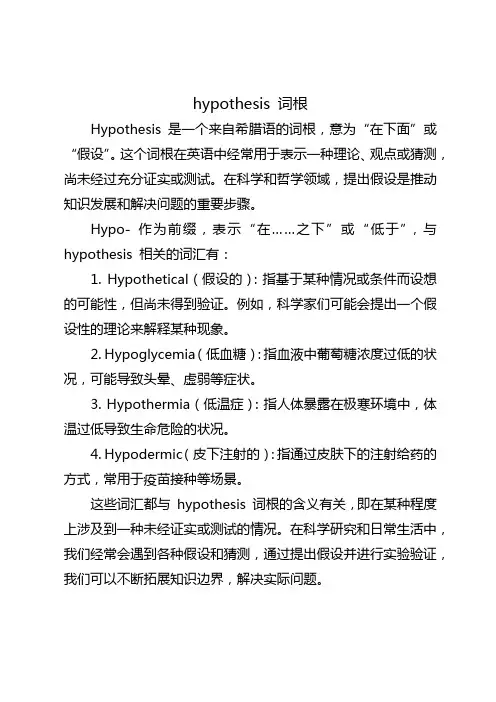
hypothesis 词根
Hypothesis 是一个来自希腊语的词根,意为“在下面”或“假设”。
这个词根在英语中经常用于表示一种理论、观点或猜测,尚未经过充分证实或测试。
在科学和哲学领域,提出假设是推动知识发展和解决问题的重要步骤。
Hypo- 作为前缀,表示“在……之下”或“低于”,与hypothesis 相关的词汇有:
1. Hypothetical(假设的):指基于某种情况或条件而设想的可能性,但尚未得到验证。
例如,科学家们可能会提出一个假设性的理论来解释某种现象。
2. Hypoglycemia(低血糖):指血液中葡萄糖浓度过低的状况,可能导致头晕、虚弱等症状。
3. Hypothermia(低温症):指人体暴露在极寒环境中,体温过低导致生命危险的状况。
4. Hypodermic(皮下注射的):指通过皮肤下的注射给药的方式,常用于疫苗接种等场景。
这些词汇都与hypothesis 词根的含义有关,即在某种程度上涉及到一种未经证实或测试的情况。
在科学研究和日常生活中,我们经常会遇到各种假设和猜测,通过提出假设并进行实验验证,我们可以不断拓展知识边界,解决实际问题。

学汉语的人用的入门级汉西字典(15)有[yǒu] haber ◆ tener有的[yǒu de] algunos有点儿[yǒu diǎn er] un poco有名[yǒu míng] famoso, conocido有时候[yǒu shí hou] a veces有一点儿[yǒu yì diǎnr] un poco, un poquito有意思[yǒu yì si] ser interesante ◆ tener sentido又[yòu] otra vez ◆ al mismo tiempo que右边[yòu biān] lado derecho鱼[yú] pez, pescado愉快[yú kuài] feliz雨[yǔ] lluvia雨伞[yǔ sǎn] sombrilla雨衣[yǔ yī] impermeable语法[yǔ fǎ] gramática语言[yǔ yán] lengua, idioma语言学[yǔ yán xué] la Lingüística玉[yù] jade预报[yù bào] pronóstico预习[fù xí] repasar (las lecciones)遇到[yù dào] encontrarse园林[yuán lín] jardín远[yuǎn] lejos ◆ lejano远方[yuǎn fāng] lugar lejano院子[yuàn zi] patio愿意[yuàn yì] desear约会[yuē huì] cita月[yuè] mes月亮[yuè liàng] luna月球[yuè qiú] Luna阅读[yuè dú] lectura阅览[yuè lǎn] leer阅览室[yuè lǎn shì] cuarto de lectura越来越[yuè lái yuè] cada vez más运动[yùn dòng] deporte运动会[yùn dòng huì] encuentro deport ivo 运动员[yùn dòng yuán] deportista ◆ jugador 运气[yùn qi] suerte杂志[zá zhì] revista再[zài] otra vez, de nuevo再见[zài jiàn] adiós, ¡hasta luego!在[zài] en ◆ estar咱们[zán men] prn nosotros (inclusivo)早[zǎo] t emprano早饭[zǎo fan] desayuno早上[zǎo shang] en la mañana枣树[zǎo shù] azufaifo怎么[zěn me] cómo ◆ por qué怎么样[zěn me yàng] ¿cómo?炸糕[zhá gāo] pastel frito占线[zhàn xiàn] línea ocupada战士[zhàn shì] guerrero战争 [z hàn zhēng] guerra站[zhàn] parada, estación张[zhāng] med掌柜[zhǎng guì] tendero丈夫[zhàng fu] marido, esposo招待会[zhāo dài huì] recepción找[zhǎo] buscar找到[zhǎo dào] encontrar找钱[zhǎo qián] dar cambio赵[Zhào] nom Zhao照顾[zhào gù] cuidar, atender照片儿[zhào piānr] fotografía照相[zhào xiàng] tomar fotos照相机[zhào xiàng jī] cámara fotográfica 这[zhè] este, esto这儿[zhèr] aquí这么[zhè me] tanto, así这样[zhè yàng] así, de esta manera针[zhēn] aguja珍贵[zhēn guì] precioso, valioso真[zhēn] real, verdadero枕头[zhěn tou] almohada, cojín挣[zhèng] ganar (dinero)整理[zhěng lǐ] poner en orden。
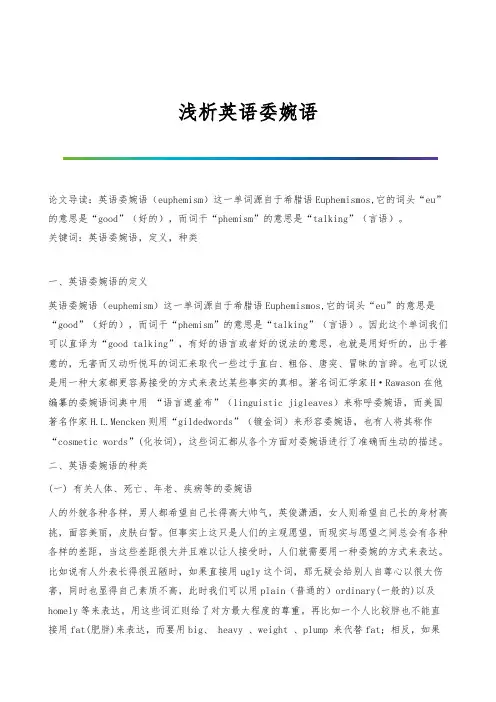
浅析英语委婉语论文导读:英语委婉语(euphemism)这一单词源自于希腊语Euphemismos,它的词头“eu”的意思是“good”(好的),而词干“phemism”的意思是“talking”(言语)。
关键词:英语委婉语,定义,种类一、英语委婉语的定义英语委婉语(euphemism)这一单词源自于希腊语Euphemismos,它的词头“eu”的意思是“good”(好的),而词干“phemism”的意思是“talking”(言语)。
因此这个单词我们可以直译为“good talking”,有好的语言或者好的说法的意思,也就是用好听的,出于善意的,无害而又动听悦耳的词汇来取代一些过于直白、粗俗、唐突、冒昧的言辞。
也可以说是用一种大家都更容易接受的方式来表达某些事实的真相。
著名词汇学家H·Rawason在他编纂的委婉语词典中用“语言遮羞布”(linguistic jigleaves)来称呼委婉语,而美国著名作家H.L.Mencken则用“gildedwords”(镀金词)来形容委婉语,也有人将其称作“cosmetic words”(化妆词),这些词汇都从各个方面对委婉语进行了准确而生动的描述。
二、英语委婉语的种类(一) 有关人体、死亡、年老、疾病等的委婉语人的外貌各种各样,男人都希望自己长得高大帅气,英俊潇洒,女人则希望自己长的身材高挑,面容美丽,皮肤白皙。
但事实上这只是人们的主观愿望,而现实与愿望之间总会有各种各样的差距,当这些差距很大并且难以让人接受时,人们就需要用一种委婉的方式来表达。
比如说有人外表长得很丑陋时,如果直接用ugly这个词,那无疑会给别人自尊心以很大伤害,同时也显得自己素质不高,此时我们可以用plain(普通的)ordinary(一般的)以及homely等来表达。
用这些词汇则给了对方最大程度的尊重。
再比如一个人比较胖也不能直接用fat(肥胖)来表达,而要用big、 heavy 、weight 、plump 来代替fat;相反,如果一位女士很瘦,也不可以直接用thin,而要用slende,slim,svelte,willomy等词来代替。
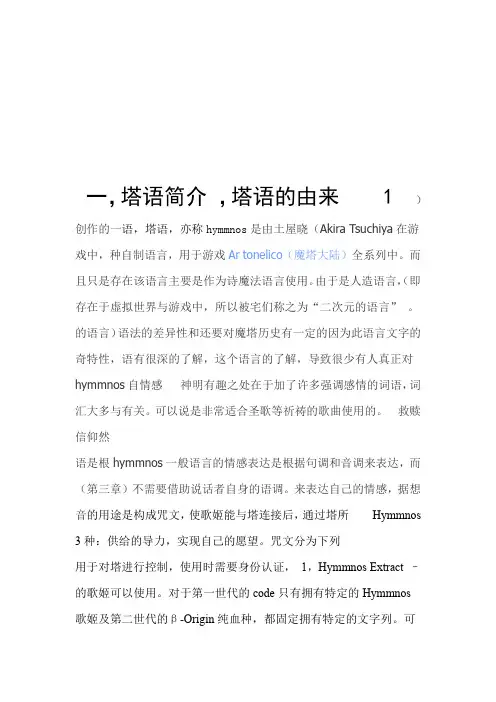
一,塔语简介,塔语的由来 1 )创作的一语,塔语,亦称hymmnos是由土屋晓(Akira Tsuchiya在游戏中,种自制语言,用于游戏Ar tonelico(魔塔大陆)全系列中。
而且只是存在该语言主要是作为诗魔法语言使用。
由于是人造语言,(即存在于虚拟世界与游戏中,所以被宅们称之为“二次元的语言”。
的语言)语法的差异性和还要对魔塔历史有一定的因为此语言文字的奇特性,语有很深的了解,这个语言的了解,导致很少有人真正对hymmnos自情感神明有趣之处在于加了许多强调感情的词语,词汇大多与有关。
可以说是非常适合圣歌等祈祷的歌曲使用的。
救赎信仰然语是根hymmnos一般语言的情感表达是根据句调和音调来表达,而(第三章)不需要借助说话者自身的语调。
来表达自己的情感,据想音的用途是构成咒文,使歌姬能与塔连接后,通过塔所Hymmnos 3种:供给的导力,实现自己的愿望。
咒文分为下列用于对塔进行控制,使用时需要身份认证,1,Hymmnos Extract –的歌姬可以使用。
对于第一世代的code只有拥有特定的Hymmnos 歌姬及第二世代的β-Origin纯血种,都固定拥有特定的文字列。
可以控制天气,重力,也有可以撼天动地的魔法,以hymmnos code的控制等。
游戏中的及塔各种环境的控制,塔守卫者(Guardian) 。
即指的是hymmnosHymmnos Extract,所有歌姬均可以使Hymmnos Word 2,–也就是所谓的“诗魔法”连接,将自己的愿望具现化的过程。
用,通过与自身的Cosmosphere 的多彩程度取决于歌姬自身内心的丰富程度。
因此可以由歌姬Word 而不是创作,其威力取决于愿望表达的强烈程度及塔对愿望的回应,具体的文字。
咒语,不能作为诗使用,其最大特征就是并不3,Hymmnos Spell –以及进行简单的控制而是为了和歌姬或者塔进行连接,由歌姬歌唱,相同。
属于在塔内已经预设好的文字列,因此Word时使用,文法与extract每座塔均不同。
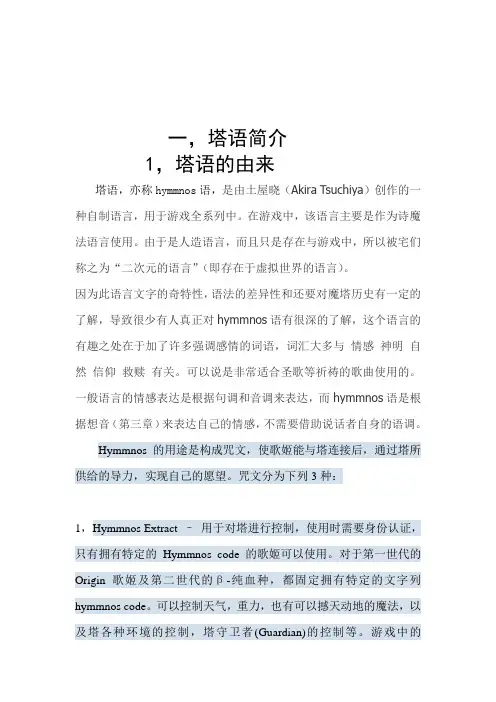
一,塔语简介1,塔语的由来塔语,亦称hymmnos语,是由土屋晓(Akira Tsuchiya)创作的一种自制语言,用于游戏全系列中。
在游戏中,该语言主要是作为诗魔法语言使用。
由于是人造语言,而且只是存在与游戏中,所以被宅们称之为“二次元的语言”(即存在于虚拟世界的语言)。
因为此语言文字的奇特性,语法的差异性和还要对魔塔历史有一定的了解,导致很少有人真正对hymmnos语有很深的了解,这个语言的有趣之处在于加了许多强调感情的词语,词汇大多与情感神明自然信仰救赎有关。
可以说是非常适合圣歌等祈祷的歌曲使用的。
一般语言的情感表达是根据句调和音调来表达,而hymmnos语是根据想音(第三章)来表达自己的情感,不需要借助说话者自身的语调。
Hymmnos的用途是构成咒文,使歌姬能与塔连接后,通过塔所供给的导力,实现自己的愿望。
咒文分为下列3种:1,Hymmnos Extract –用于对塔进行控制,使用时需要身份认证,只有拥有特定的Hymmnos code的歌姬可以使用。
对于第一世代的Origin歌姬及第二世代的β-纯血种,都固定拥有特定的文字列hymmnos code。
可以控制天气,重力,也有可以撼天动地的魔法,以及塔各种环境的控制,塔守卫者(Guardian)的控制等。
游戏中的hymmnos即指的是Hymmnos Extract。
2,Hymmnos Word –也就是所谓的“诗魔法”,所有歌姬均可以使用,通过与自身的Cosmosphere连接,将自己的愿望具现化的过程。
Word的多彩程度取决于歌姬自身内心的丰富程度。
因此可以由歌姬创作,其威力取决于愿望表达的强烈程度及塔对愿望的回应,而不是具体的文字。
3,Hymmnos Spell –咒语,不能作为诗使用,其最大特征就是并不由歌姬歌唱,而是为了和歌姬或者塔进行连接,以及进行简单的控制时使用,文法与Word相同。
属于在塔内已经预设好的文字列,因此每座塔均不同。
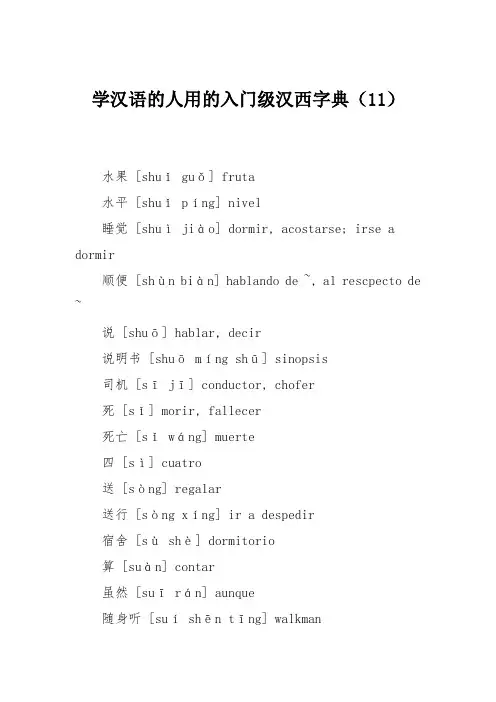
学汉语的人用的入门级汉西字典(11)水果[shuǐ guǒ] fruta水平[shuǐ píng] nivel睡觉[shuì jiào] dormir, acostarse; irse a dormir顺便[shùn biàn] hablando de ~, al rescpecto de ~说[shuō] hablar, decir说明书[shuō míng shū] sinopsis司机[sī jī] conductor, ch ofer死[sǐ] morir, fallecer死亡[sǐ wáng] muerte四[sì] cuatro送[sòng] regalar送行[sòng xíng] ir a despedir宿舍[sù shè] dormitorio算[suàn] contar虽然[suī rán] aunque随身听[suí shēn tīng] walkman岁[suì] med años de edad岁数[suì shu] edad所以[suǒ yǐ] por eso他[tā] prn él他们[tā men] prn ellos它[tā] prn él ◆ eso (sólo objetos inanimados)它们[tā men] prn esas cosas塔[tǎ] pagoda台[tái] estación太[tài] demasiado, extremadamente太极拳[tài jí quán] (zh) Taijichuan, Tai chi chuan太平洋[tái píng yáng] Océano Pacífico太太[tài tai] Señora太阳[tài yang] sol谈[tán] charlar谈话[tán huà] conversar谈判[tán pàn] negociar探亲[tàn qīn] visitar a la familia汤[tāng] sopa唐山[Táng shān] geo Tangshan糖[táng] azúcar躺[tǎng] mentir套[tào] med特别[tè bié] especial疼[téng] doler藤野[Téng yě] nom Teng Ye踢[tī] patear提[tí] proponer提高[tí gāo] mejorar ◆ incrementarse体温[tǐ wēn] temp eratura corporal体育[tǐ yù] educación física体育场[tǐ yù chǎng] estadio替[tì] para {替我→ para mí}天[tiān] día ◆ Cielo天安门[Tiān ān mén] geo Tiananmen天气[tiān qì] clima天使[tiān shǐ] ángel填[tián] llenar条[tiáo] med (para cosa s largas: pantalones, ríos, etc.)条件[tiáo jiàn] condición条子[tiáo zi] nota跳[tiào] brincar跳舞[tiào wǔ] bailar贴[tiē] pegar听[tīng] escuchar, oír听力[tīng lì] audición (de oír)听说[tīng shuō] oír (o que alguien dice) ◆ se dice que亭子[tíng zi] vestidor停[tíng] parada停车[tíng chē] estacionar el auto挺立[tǐng lì] estar en firme同事[tóng shì] colega同乡[tóng xiāng] paisano同学[tóng xué] compañero de clase同意[tóng yì] estar de acuerdo同志[tóng zhì] camarada偷[tōu] robar头[tóu] cabeza头发[tóu fa] cabello透视[tòu shì] tomar radiografía。
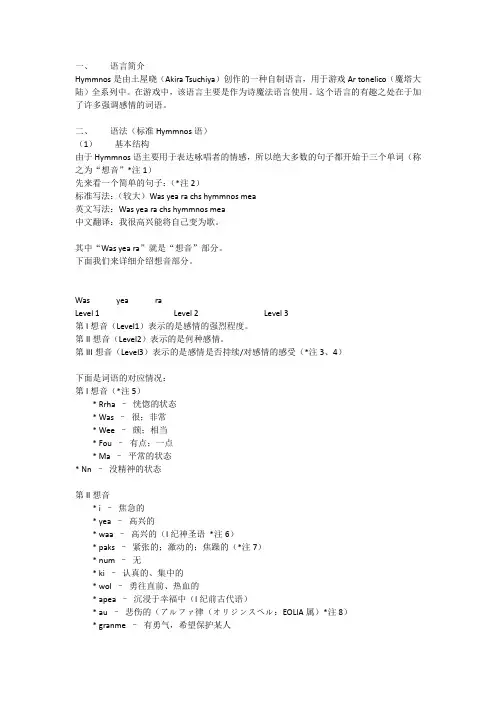
一、语言简介Hymmnos是由土屋晓(Akira Tsuchiya)创作的一种自制语言,用于游戏Ar tonelico(魔塔大陆)全系列中。
在游戏中,该语言主要是作为诗魔法语言使用。
这个语言的有趣之处在于加了许多强调感情的词语。
二、语法(标准Hymmnos语)(1)基本结构由于Hymmnos语主要用于表达咏唱者的情感,所以绝大多数的句子都开始于三个单词(称之为“想音”*注1)先来看一个简单的句子:(*注2)标准写法:(较大)Was yea ra chs hymmnos mea英文写法:Was yea ra chs hymmnos mea中文翻译:我很高兴能将自己变为歌。
其中“Was yea ra”就是“想音”部分。
下面我们来详细介绍想音部分。
Was yea raLevel 1 Level 2 Level 3第I想音(Level1)表示的是感情的强烈程度。
第II想音(Level2)表示的是何种感情。
第III想音(Level3)表示的是感情是否持续/对感情的感受(*注3、4)下面是词语的对应情况:第I想音(*注5)* Rrha –恍惚的状态* Was –很;非常* Wee –颇;相当* Fou –有点;一点* Ma –平常的状态* Nn –没精神的状态第II想音* i –焦急的* yea –高兴的* waa –高兴的(I纪神圣语*注6)* paks –紧张的;激动的;焦躁的(*注7)* num –无* ki –认真的、集中的* wol –勇往直前、热血的* apea –沉浸于幸福中(I纪前古代语)* au –悲伤的(アルファ律(オリジンスペル:EOLIA属)*注8)* granme –有勇气,希望保护某人* touwaka –渴望的、隐藏着心情的* quel –恳切的;必死的* yant –恐慌的(I纪神圣语)* guwo –发怒的;愤怒的* jyel –寂寞的* zweie –真挚的;隐藏着决定的第III想音(*注9)* ga –(我)希望尽快结束的* ra -(我)希望持续的* erra -(我)希望永远地持续的* wa –这没有什么关系,我会接受这个情况* gaya –我再也不想回到之前的状态了* gagis –自己怎么样也无所谓想音部分介绍完毕。
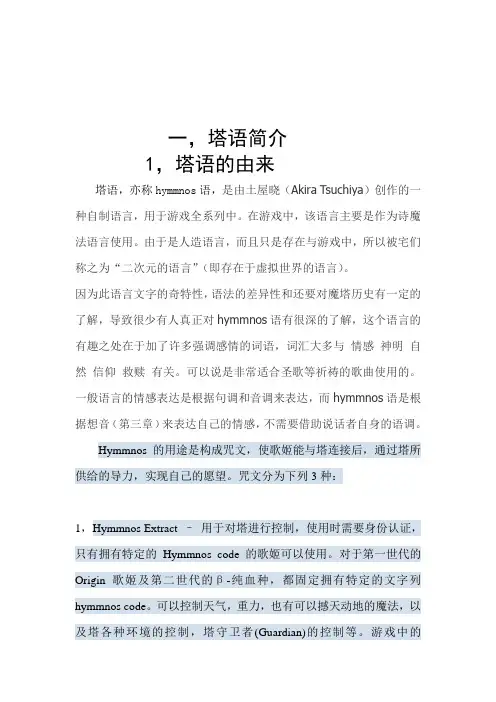
一,塔语简介1,塔语的由来塔语,亦称hymmnos语,是由土屋晓(Akira Tsuchiya)创作的一种自制语言,用于游戏全系列中。
在游戏中,该语言主要是作为诗魔法语言使用。
由于是人造语言,而且只是存在与游戏中,所以被宅们称之为“二次元的语言”(即存在于虚拟世界的语言)。
因为此语言文字的奇特性,语法的差异性和还要对魔塔历史有一定的了解,导致很少有人真正对hymmnos语有很深的了解,这个语言的有趣之处在于加了许多强调感情的词语,词汇大多与情感神明自然信仰救赎有关。
可以说是非常适合圣歌等祈祷的歌曲使用的。
一般语言的情感表达是根据句调和音调来表达,而hymmnos语是根据想音(第三章)来表达自己的情感,不需要借助说话者自身的语调。
Hymmnos的用途是构成咒文,使歌姬能与塔连接后,通过塔所供给的导力,实现自己的愿望。
咒文分为下列3种:1,Hymmnos Extract –用于对塔进行控制,使用时需要身份认证,只有拥有特定的Hymmnos code的歌姬可以使用。
对于第一世代的Origin歌姬及第二世代的β-纯血种,都固定拥有特定的文字列hymmnos code。
可以控制天气,重力,也有可以撼天动地的魔法,以及塔各种环境的控制,塔守卫者(Guardian)的控制等。
游戏中的hymmnos即指的是Hymmnos Extract。
2,Hymmnos Word –也就是所谓的“诗魔法”,所有歌姬均可以使用,通过与自身的Cosmosphere连接,将自己的愿望具现化的过程。
Word的多彩程度取决于歌姬自身内心的丰富程度。
因此可以由歌姬创作,其威力取决于愿望表达的强烈程度及塔对愿望的回应,而不是具体的文字。
3,Hymmnos Spell –咒语,不能作为诗使用,其最大特征就是并不由歌姬歌唱,而是为了和歌姬或者塔进行连接,以及进行简单的控制时使用,文法与Word相同。
属于在塔内已经预设好的文字列,因此每座塔均不同。
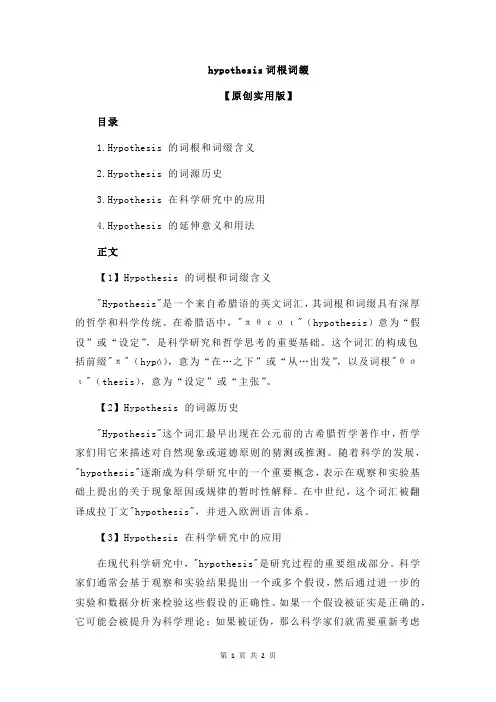
hypothesis词根词缀【原创实用版】目录1.Hypothesis 的词根和词缀含义2.Hypothesis 的词源历史3.Hypothesis 在科学研究中的应用4.Hypothesis 的延伸意义和用法正文【1】Hypothesis 的词根和词缀含义"Hypothesis"是一个来自希腊语的英文词汇,其词根和词缀具有深厚的哲学和科学传统。
在希腊语中,"πθεσι"(hypothesis)意为“假设”或“设定”,是科学研究和哲学思考的重要基础。
这个词汇的构成包括前缀"π"(hypó),意为“在…之下”或“从…出发”,以及词根"θσι"(thesis),意为“设定”或“主张”。
【2】Hypothesis 的词源历史"Hypothesis"这个词汇最早出现在公元前的古希腊哲学著作中,哲学家们用它来描述对自然现象或道德原则的猜测或推测。
随着科学的发展,"hypothesis"逐渐成为科学研究中的一个重要概念,表示在观察和实验基础上提出的关于现象原因或规律的暂时性解释。
在中世纪,这个词汇被翻译成拉丁文"hypothesis",并进入欧洲语言体系。
【3】Hypothesis 在科学研究中的应用在现代科学研究中,"hypothesis"是研究过程的重要组成部分。
科学家们通常会基于观察和实验结果提出一个或多个假设,然后通过进一步的实验和数据分析来检验这些假设的正确性。
如果一个假设被证实是正确的,它可能会被提升为科学理论;如果被证伪,那么科学家们就需要重新考虑他们的假设或重新设计实验。
【4】Hypothesis 的延伸意义和用法除了在科学研究中的应用,"hypothesis"这个词汇在日常生活中也有广泛的用法。
它常常用来表示对某个问题或现象的猜测或推测,不一定需要严格的科学依据。
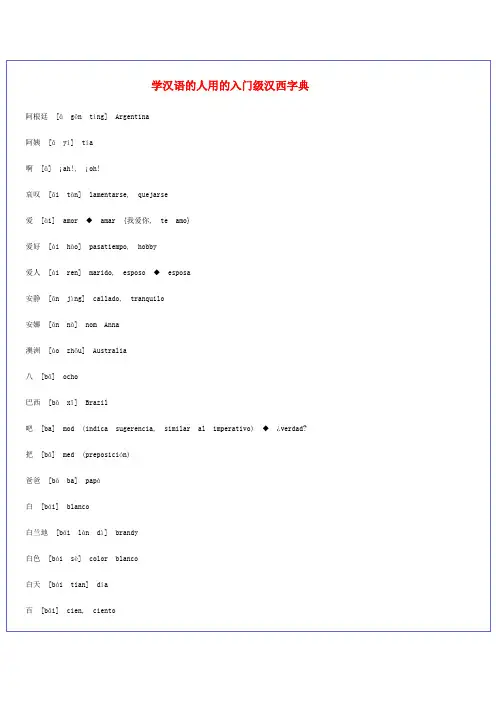
学汉语的人用的入门级汉西字典阿根廷[ügýn tíng] Argentina阿姨[üyí]tía啊[ü]¡ah!,¡oh!哀叹[üi tàn] lamentarse, quejarse爱[ài] amor ◆ amar {我爱你, te amo}爱好[ài hào] pasatiempo, hobby爱人[ài ren] marido, esposo ◆ esposa安静[ün jìng] callado, tranquilo安娜[ün nà] nom Anna澳洲[ào zhōu] Australia八[bü] ocho巴西[büxÿ] Brazil吧 [ba] mod (indica sugerencia, similar al imperativo) ◆¿verdad?把[bǎ] med (preposiciïn)爸爸[bà ba] papá白[bái] blanco白兰地[bái lán dì] brandy白色[bái sâ] color blanco白天[bái tian] día百[bǎi] cien, ciento百货[bǎi huî] de varios artículos摆[bǎi] poner拜年[bài nián] desear buen año nuevo扳[bün] llevarse ◆ jalar班[bün] equipo ◆ trabajo办[bàn] hacer办公室[bàn gōng shì] oficina半[bàn] mitad帮[büng] ayudar帮助[büng zhù] ayudar ◆ ayuda包[büo] envolver, cubrir包裹[büo guǒ] parcela, lote保持[bǎo chí] guardar, quedar, mantener 保护[bǎo hù] proteger保险[bǎo xiǎn] seguro ◆ asegurar报[bào] llevar en brazos报[bào]periïdico报名[bào míng] inscribirse;registrarse爆竹 [bào zhú] petardo杯[býi] med taza北边[bþi bien] Norte北海[Bþi hǎi] mar del norte ◆ nom Beihai北京[bþi jÿng] Beijing (Pekín)被[bâi] nom por ~, en voz pasiva本[bþn] med本子[bþn zi] cuaderno, o libro笨[bân] tonto逼[bÿ] forzar鼻子[bí zi] nariz比[bǐ] nom que (en comparaciones)比较[bǐjiào] en comparaciïn, comparativamente ◆ comparar 比赛[bǐsài] competir ◆ competencia比索[bǐsuǒ] peso (moneda)笔[bǐ] med, pluma, o lápiz o pincel毕业[bìyâ] graduarse边[biün] lado ◆ esquina, margen便宜[pián yi] barato遍[biàn] med vez表[biǎo] expresar ◆ reloj表演[biǎo yǎn] representar ◆representaciïn别[biã] no ~别的[biã de] otro别人[biãrãn] otros ◆ los demás冰棍儿[bÿng gùnr] paleta de hielo冰鞋[bÿng xiã] patines兵[bÿng] soldado并且[bìng qiþ] además病[bìng] enfermedad ◆ estar enfermo ◆ enfermarse病房[bìng fáng]pabellïn de hospital病人[bìng rãn] paciente博物馆[bïwùguǎn] museo薄[báo] delgado不[bù] adv no不错[búcuî] correcto, no equivocado不但...而且[búdàn ... ãr qiþ] no solamente..., sino tambiãn...不敢当[bùgǎn düng] exp no merecer su halago不好意思[bùhǎo yì si] sentirse avergonzado不同[bùtïng] diferente不用[bùyîng] no hay necesidad de布[bù] trapo de algodïn布朗[Bùlǎng] nom Brown布鞋[bùxiã] zapatos de tela部长[bùzhǎng] ministro才[cái] apenas, reciãn◆ hasta que裁判[cái pàn]árbitro,rãferi◆ ser juez彩旗[cǎi qí] bandera de color菜[cài] plato ◆ vegetal, verdura菜单[cài dün]menú参观[cün guün] ir a ver, visitar (lugares)参加[cün jiü] participar, aunarse参赞[cün zàn]cïnsul餐厅[cün tÿng] comedor, refectorio操场[cüo chǎng] cancha草[cǎo] pasto, cãsped厕所[câsuǒ] (mx) baño, (es) servicio, váter层[cãng] piso查[chá] investigar, examinar茶[chá]tã茶馆[cháguǎn]cafetería (de tã)茶壶[cháhú] tetera茶具[chájù] juego de tã, vajilla para el tã茶碗[cháwǎn] taza de tã差[chà] faltar, carecer长[cháng] largo长城[Cháng chãng] la Gran Muralla China长短[cháng duǎn] s largo长江[Cháng Jiüng] nom el río Changjiang (Yangtze) 长廊[Cháng Láng] el Corredor Largo尝[cháng] probar常[cháng] frecuentemente常常[cháng cháng] frecuentemente, (mx) seguido唱[chàng] cantar唱片[chàng piàn] disco (de música)朝鲜[Cháo xiǎn] Corea车[chý] coche, vehículo车间[chýjiün] taller车站[chýzhàn] parada de autobús◆estaciïn de tren 陈毅[Chãn Yì] nom Chenyi衬衫[chân shün] camisa ◆ blusa成[chãng] volverse, convertirse; ponerse成功[chãng gōng] tener ãxito成绩[chãng jÿ] logro成语[chãng yǔ] proverbio, refrán诚实[chãng shí] honrado城[chãng] ciudad ◆ pueblo城市[chãng shì] ciudad吃[chÿ] comer吃饭[chÿfàn] comer吃午饭[chÿwǔfàn] almorzar吃早饭[chÿzǎo fàn] desayunar尺[chǐ] chi (unidad de 33 cm.) ◆ s regla崇祯[Chïng zhýn] nom el Emperador Chongzhen抽烟[chōu yün] v fumar绸子[chïu zi] s tela de seda出[chū] v salir出差[chū chüi] s viaje de trabajo出发[chūfü] v salir, partir ◆ comenzar出生[chūshýng] v nacer出院[chūyuàn] v salir del hospita, ser dado de alta 出租汽车[chūzūqìchý] s taxi初[chū] prf除了...以外[chú le ... yǐwài] excepto, a pesar除夕[chúxÿ] noche vieja厨房[chúfáng] cocina穿[chuün] vestir, vestirse穿马路[chuün mǎlù] atravesar (una calle)船[chuán] bote, barca窗户[chuüng hu] ventana窗口[chuüng kǒu] ventana床[chuáng] cama春节[Chūn Jiã] festival de primavera春联[chūn lián] tiras de primavera春天 [chūn tiün] primavera词[cí] palabra词典[cídiǎn] diccionario瓷器[cíqì] vajilla, porcelana辞退[cítuì] despedir次[cì] med vez从[cïng] desde聪明[cōng ming] inteligente, listo存[cún] depositar存车处[cún chýchù] estacionamiento ◆ bicicletero存款单 [cún kuǎn dün] libreta de ahorros错[cuî] equivocado ◆ error错误[cuîwù]equivocaciïn, error达尼亚[Dáníyà] nom Daniya打[dǎ] golpear ◆ practicar (un deporte) ◆ llamar, marcar (un telãfono)打错了[dǎcuî le] número equivocado打的[dǎdÿ] tomar un taxi打电话[dǎdiàn huà] llamar por telãfono, telefonear打开[dǎküi] abrir打破[dǎpî] romper打拳[dǎquán] practicar boxeo de sombra打扫[dǎsǎo] limpiar打算[dǎ suan] planear打针[dǎzhýn] inyectar ◆ ser inyectado大[dà] grande, gran大便[dàbiàn] excremento大夫[dài fu] mãdico, doctor大概[dàgài] alrededor de ~, aproximadamente 大家[dàjiü] todos, cada uno大楼[dàlïu] edificio de ~大娘[dàniáng]tía大声[dàshýng] voz alta大使[dàshǐ] embajador大使馆[dàshǐguǎn] embajada大西洋[dàxÿyáng]Ocãano Atlántico大学[dàxuã] universidad大洋周[Dàyáng Zhōu]Oceanía大爷[dà ye] tío大衣[dàyÿ] abrigo代表[dài biǎo] representante代表团[dài biǎo tuán]delegaciïn, comitiva 带[dài] traer, llevar consigo袋[dài] bolsa戴[dài] vestir, llevar单[dün] cuenta, boleta担心[dün xÿn] preocuparse但是[dàn shì] pero, sin embargo蛋[dàn] huevo蛋糕[dàn güo] pastel当[düng] servir de, trabajar de当然 [dėng rán] por supuesto, ciertamente当心[düng xÿn] cuidar de, preocuparse por岛[dǎo] isla到[dào] hasta ◆ llegar得 [de] (prt)得病[dãbìng] enfermarse, contagiarse德国[Dãguï] Alemania的 [de] (prt) de灯[dýng]lámpara灯节[Dýng Jiã] Dengjie, festival de las luces 灯笼[dýng long] linterna等[dþng] esperar地 [de] (prt) -mente地方[dì fang] lugar地理[dìlǐ]geografía地铁[dìtiþ] metro, subterráneo地图[dìtú] mapa地址[dízhǐ]direcciïn弟弟[dì di] hermano menor第[dì] prf (para números cardinales)典型[diǎn xíng]típico点[diǎn] med hora ◆ en punto点心[diǎn xÿn] bocadillo点种[diǎn zhōng] en punto电报[diàn bào] telegrama电车[diàn chý]trolebús电话[diàn huà]telãfono◆ llamada telefïnica电脑[diàn nǎo] computadora电视[diàn shì] television, tv电视台[diàn shìtái] televisora, estaciïn de televisiïn 电影[diàn yǐng]película电影院[diàn yǐng yuàn] cine, sala de cine电邮 [diàn yïu] correo electrïnico, e-mail电子[dián zǐ]electrïnico店[diàn] tienda吊[diào] colgar钓[diào] pescar钓鱼[diào yú] pescar丁云[Dÿng Yún] nom Ding Yun顶[dǐng] med订[dìng] suscribirse定作[dìng zuî] ordenar丢[diū] perder东边[dōng bian] Este东西[dōng xi] cosa冬天[dōng tiün] invierno懂[dǒng] entender, comprender动[dîng] mover动物[dîng wù] animal动物园[dîng wùyuán]zoolïgico都[dōu] todos豆腐[dîu fu] tofu, cuajada de soya, queso de soya 独唱[dúchàng] solo musical肚子[dù zi] abdomen, vientre度[dù] med, grado度假[dùjià] pasar las vacaciones短[duǎn] corto锻炼[duàn liàn] hacer ejercicio队[duì] equipo对[duì] correcto ◆ para对不起[duì bu qǐ]perdïn, disculpa对面[duìmiàn] opuesto对象[duìxiàng] novio, novia多[duō] muchos多么[duō me] cïmo◆quã多少[duō shao] cuántos饿[â] tener hambre儿子[ãr zi] hijo耳朵[þr duo] oreja, oído二[âr] dos发烧[füshüo] tener fiebre发生[füshýng] ocurrir发现[füxiàn] descubrir发音[füyÿn]pronunciaciïn, pronunciar 发展[füzhǎn] desarrollarse法国[Fǎguï] Francia法语[Fǎyǔ]francãs (idioma)翻译[fün yì] traducir ◆ traductor饭[fàn] comida ◆ arroz饭店[fàn diàn] restaurante饭馆[fàn guǎn] restaurante方便[füng biàn] convenir方向[füng xiàng]direcciïn,orientaciïn房间[fáng jiün] cuarto房子[fáng zi] casa访问[fǎng wân] visitar彷徨[Páng huáng] Panghuang放[fàng] poner放爆竹[fàng bào zhú] soltar cohetitos放假[fàng jià] estar de vacaciones, tener feriados 放心[fàng xÿn] tranquilizarse飞到[fýi dào] llegar volando飞机[fýi jÿ]aviïn飞机场[fýi jÿchǎng] aeropuerto非- [fýi] no ~非常[fýi cháng] extremadamente非洲[Fýi Zhōu]África肥[fãi] holgado ◆ gordo, obeso肺[fâi]pulmïn肺炎[fâi yán]neumonía分[fýn] med fen (moneda) ◆ med minuto分别[fýn biã] separar, partir分机[fýn jÿ]extensiïn分钟[fýn zhōng] minuto丰富[fýng fù] rico, abundante风[fýng] viento; aire风景[fýng jǐng] escenario, paisaje, panorama 风俗[fýng sú] costumbre风味[fýng wâi] sabor típico封[fýng] med夫人[fū ren] dama, señora服务[fúwù] servir服务员[fúwùyuán] mesero, mesera服装[fúzhuüng] vestido, traje幅[fǔ] med福[fú] buena fortuna斧子[fǔ zi] hacha辅导[fǔdǎo] dar tutoría阜成门[Fùchãng mãn] Fucheng men复习[fùxí] repasar复杂[fùzá] complicado, complejo改[gǎi] corregir盖儿[gàir] tapa, cubierta干[gàn] trabajar, hacer干杯[gün býi] brindar, brindis干净[gün jing] limpiar肝[gün]hígado感到[gǎn dào] sentirse感动[gǎn dîng] emocionar, conmover ◆ emocionado, conmovido 感冒[gǎn mào] dar gripa ◆ gripa感想[gǎn xiǎng]impresiïn, sentimiento感谢[gǎn xiâ] agradecer感兴趣[gǎn xìng qù] estar interesado刚[güng] apenas, hace poco刚才[güng cái] justo ahora高[güo] alto, elevado高兴[güo xìng] contento, alegre, feliz告诉[gào su] contar, decir, avisar哥哥[gý ge] hermano mayor歌儿[gýr]canciïn歌剧[gýjù]ïpera阁楼[gãlïu]ático个[gâ] med (para personas, etc.)个子[gâ zi] altura各[gâ] cada给[gþi] a, para ◆ dar跟[gýn] con ◆ seguir更[gâng]más,aún más,todavía más工厂[gōng chǎng]fábrica工程师[gōng chãng shÿ] ingeniero工地[gōng dì]construcciïn (lugar)工人[gōng rãn] trabajador工艺品[gōng yìpǐn]artesanía工作[gōng zuî] v trabajar ◆ s trabajo公分[gōng fýn] med centímetro公共[gōng gîng]público公共汽车[gōng gîng qìchý]camiïn公斤[gōng jÿn] kilogramo公里[gōng lǐ]kilïmetro公平[gōng píng] feria公司 [gōng sÿ]compañía公园[gōng yuán] parque público功夫[gōng fu] kung fu恭贺新禧[gōng hâxÿn xǐ]¡Feliz año nuevo! 勾[gîu] bastante, suficiente狗[gǒu] perro ◆(año chino) perro姑娘[gū niang] muchacha, chica古[gǔ] antiguo, viejo (para cosas)古波[Gǔbō] nom Gubo古代[gǔdài] la antiguedad古典[gǔdiǎn]clásico古迹[gǔjÿ] reliquia arqueolïgica鼓掌[gǔzhǎng] aplaudir故宫[Gùgōng] Palacio Imperial故居[gùjū] domicilio antiguo故事[gùshì] cuento, historia故乡[gùxiüng] tierra natal顾客[gùkâ] cliente顾问[gùwân] consejero刮风[guüfýng] soplar [el viento]挂[guà] colgar, poner arriba拐[guǎi] dar la vuelta拐弯[guǎi wün] dar vuelta en la esquina关[guün] cerrar关心[guün xÿn] preocuparse, ocuparse de观众[guün zhîng] audiencia广播[guǎng bō] radiodif usiïn广播室[guǎng bōshì] cuarto de radiodifusiïn 广播员[guǎng bōyuán] anunciador广场[guǎng chǎng] plaza广州[Guǎng zhōu] nom Guangzhou规律[guÿlǜ] regla鬼[guǐ] diablo柜台[guìtái] mostrador贵[guì] caro, valioso ◆ noble贵姓[guìxìng]¿cuál es su apellido? 郭沫若[GuōMîruî] Guo Moruo国[guï]país国际[guïjì] internacional国家[guïjiü]país,naciïn过[guî] pasar ◆ haber孩子[hái zi] niño, hijo海[hǎi] mar寒假[hán jià] vacaciones de invierno 喊[hǎn] pegar de gritos, vociferar汉语[hàn yǔ] chino (idioma)汉字[hàn zì] hanzi, caracter chino航空[háng kōng] correo aãreo好[hǎo] bueno, buen好吃[hǎo chÿ] sabroso, rico, delicioso 好看[hǎo kàn] hermoso, bonito好客[hào kâ] hospitalario号[hào]día◆número号码[hào mǎ]número号日[hào rì]día, fecha喝[hý] beber, tomar合唱[hãchàng] coro合适[hãshì] quedar, ir bien con和[hã] y和平[hãpíng] s paz河[hã]río黑[hýi] negro黑暗[hýiàn] obscuro, oscuro很[hþn] adv muy红[hïng] rojo红茶[hïng chá]tã negro红莲[hïng lián] loto rojo红楼梦[hïng lïu mâng] Sorgo rojo, Sueño de pisos rojos 红绿灯[hïng lǜdýng]semáforo红叶[hïng yâ] hoja roja, hoja de maple猴[hïu](año chino) mono后边[hîu biün]atrás,detrás后来[hîu lái]despuãs厚[hîu] grueso, gordo胡同[hútîng] pasadizo, pasaje壶[hú] olla湖 [hú] lago虎[hǔ](año chino) tigre互相[hùxiüng] el uno al otro, mutuamente护士[hù shi] enfermera护照[hùzhào] pasaporte花[huü] gastar dinero花茶[huüchá]tãaromático花儿[huür] flor花园[huüyuán]jardín华表[huábiǎo] pilar de mármol华侨[huáqiáo] China de ultramar滑冰[huábÿng] patinar滑雪[huáxuþ]esquí◆ esquiar画[huà] dibujar, pintar画报[huàbào] revista ilustrada画儿[huàr] dibujo ◆ pintura画展[huàzhǎn]exposiciïn de arte话[huà] habla; palabra话剧[huàjù] drama vocal怀念[huái niàn] apreciar, acordarse de坏[huài] algo que no va bien欢迎[huün yíng] bienvenido ◆ dar la bienvenida还[hài]todavía,aún◆además还[huán] regresar还是[hái shi] o换[huàn] cambiar ◆ transbordar皇帝[huáng dì] emperador黄[Huáng] nom Huang黄河[Huáng Hã] nom río Huanghe, el río amarillo 灰[huÿ] gris恢复[huÿfù] recuperarse回[huí] regresar, volver回答[huídá] contestar, responder ◆ respuesta 回来[huílái] regresar会[huì] poder hacer, saber hacer婚礼[hūn lǐ] boda活[huï] vivir ◆ vivo活儿[huïr] trabajo火[huǒ] fuego火车[huǒchý] tren火腿[huǒtuǐ]jamïn或者[huîzhþ] o货[huî]artículo,mercancía机场[jÿchǎng] aeropuerto机会[jÿhuì] oportunidad鸡[jÿ](año chino) gallo鸡蛋[jÿdàn] huevo de gallina迹[jÿ] rastro, huella激动[jÿdîng] emocionado极了[jí le] extremadamente集合[jíhã] reunir几[jǐ]¿cuántos? (para numeros menores de 10) 挤[jǐ] apretado ◆ apretar记[jì] apuntar, registrar ◆ recordar记录[jìlù] registrar, grabar纪念[jìniàn] conmemorar寄[jì] enviar correo加拿大[jÿa nádà]Canadá加深[jiüshýn] ahondar家[jiü] casa, hogar ◆ familia价钱[jiàqián] precio假期[jiàqÿ] vacaciones坚持[jiün chí] insistir, persistir间[jiün] med检查[jiǎn chá] examinar ◆examen mãdico简朴[jiǎn pǔ] sencillo, sin adorno见[jiàn] ver见面[jiàn m iàn] conocerse el uno al otro件[jiàn] med (para artículos)建设[jiàn shâ] construir建筑[jiàn zhù] construir健康[jiàn küng] salud ◆ sano江西[Jiüng xÿ] nom Jiangxi将来[jiüng lái] futuro讲[jiǎng] explicar讲解[jiǎng jiþ] explicar讲解员[jiǎng jiþyuán] guiar奖状[jiǎng zhuàng] certificado交[jiüo] pagar胶卷[jiüo juǎn] rollo de película脚[jiǎo] pie叫[jiào] llamarse ◆ llamar ◆ ladrar教[jiüo]enseñar (en clase, etc)教练[jiào liàn] entrenador, coach ◆ entrenar 教室[jiào shì]salïn de clase教授[jiào shîu] profesor教堂[jiào táng] iglesia接[jiý] recibir ◆ contestar (el telãfono)接人[jiýrãn] conocer a una persona接吻[jiýwþn] besar街[jiý] calle街道[jiýdào] calle节[jiã] festival ◆ (cls) hora节目[jiãmù] programa节日[jiãrì]día feriado结婚[jiãhūn] casarse她[tü] prn ella姐姐[jiþ jie] hermana mayor解[jiþ] desahogarse解放[jiþfàng] liberar介绍[jiâshào] presentar ◆presentaciïn 借[jiâ] prestar今年[jÿn nián] este año今天[jÿn tiün] hoy金字塔[jÿn zìtǎ]pirámide紧[jǐn] cercano近 [jìn] cerca进[jìn] entrar进步[jìn bù] progreso, avance进来[jìn lái] entrar京剧[jÿng jù] (zh) Opera de Beijing经理[jÿng lǐ] gerente精力[jÿng lì]energía景德镇[Jǐng dãzhân] nom Jingdezhen景山[Jǐng shün] nom Jingshan镜头[jìng tïu] lente de cámara镜子[jìng zi] espejo九[jiǔ] nueve酒[jiǔ] licor, vino旧[jiù] viejo, usado就[jiù] precisamente居留证[jūliúshâng] certificado de residencia 桔子[jú zi] naranaja桔子水[jú zi shuǐ] naranjada举行[jǔxíng] celebrar, efectuar句[jù] med frase句子[jù zi] o raciïn剧[jù] drama teatral剧场[jùchǎng] teatro聚会[jùhuì] reunirse决定[juãdìng] decidir绝[juã] desaparecer ◆ absoluto觉得[juã de] pensar, sentir觉得[juã de] sentir, parecer que咖啡[küfýi]cafã咖啡馆[küfýi guǎn]cafetería开[küi] abrir开车 [küi chý] manejar, conducir开花儿[küi huür] florecer开会[küi huì] presentarse en asamblea开始[küi shǐ] empezar, comenzar开学[küi xuã] comenzar el curso开演[küi yǎn] comenzar (una representaciïn)看[kàn] ver ◆ leer看病[kàn bìng] ir a consulta, ver al mãdico 看见[kàn jiàn] ver看书[kàn shū] leer考[kǎo] tomar un examen ◆ hacer un examen 考试[kǎo shì] examen ◆ examinar烤肉[kǎo rîu] carne asada科[ký]secciïn, departamento咳嗽[kã sou] toser可爱[kþài] encantador可能[kþnãng] ser posible可是[kþshì] pero, sin embargo可笑[kþxiào] chistoso可以[kþyǐ] poderse, ser posible ◆quizá渴[kþ] tener sed ◆ sediento刻[kâ] med 15 minutos, cuarto de hora客气[kâ qi] cortãs, educado客人[kâ ren] huãsped, visitante, visita, invitado 客厅[kâtÿng] sala de invitados课[kâ] clase课本[kâbþn] libro de texto课间[kâjiün] receso (entre clases)课文[kâwãn] texto空儿[kîngr] tiempo libre空气[kōng qì] aire口语[kǒu yǔ] lengua hablada哭[kū] llorar裤子[kù zi] calzïn块[kuài] yuan快[kuài]rápido快乐[kuài lâ] feliz筷子[kuài zi] palillos chinos宽[kuün] ancho矿泉水[kuàng quán shuǐ] agua mineral昆明湖[Kūn míng Hú] nom lago Kinming困[kùn] adormilado拉[lü] acarrear ◆ tocar (instrumentos de cuerda) 来[lái] venir ◆ (como complemento) hacia acá来自[lái zì] venir兰花[lán huü]orquídea蓝[lán] azul篮球[lán qiú] basketball狼[láng] lobo劳动[láo dîng] laborar老[lǎo] anciano, viejo老虎[lǎo hǔ] tigre老舍[Lǎo Shþ] nom老师[lǎo shÿ] maestro, profesor姥姥[lǎo lao] abuela materna累[lâi] estar cansado冷[lþng] tener frío厘米[límǐ]centímetro离[lí] desde离开[líküi] partir, salir, irse礼堂[lǐtáng] auditorio礼物[lǐwù] regalo李[Lǐ] nom Li李自成[LǐZìchãng] nom Li Zicheng里[lǐ] dentro里边[lǐbiün] dentro理想[lǐxiǎng] ideal力气[lì qi] fuerza历史[lìshǐ] historia立[lì] estar de pie立刻[lìkâ] inmediatamente丽丽[Lìlì] nom Lili利害[lì hai] terrible, serio利用[lìyîng] usar俩[liǎ] ambos连...也... [lián ... yþ ...] aún联系[lián xi] poner en contacto练习[liàn xí] hacer ejercicios, practicar 凉快[liáng kuai] fresco粮食[liáng shi] comida两[liǎng] dos亮[liàng] brillo辆[liàng] med (contador para vehículos)量[liáng] medir聊天儿[liáo tiünr] charlar了 [le] mod了解[liǎo jiþ] comprender料子[liào zi] material邻居[lín jū] vecindario, vecino临摹[lín mï] copiar灵魂[líng hún] alma铃[líng] timbre, campana零[líng] cero零钱[líng qián] cambiar (dinero)流利[liúlì] fluido, corriente留[liú] quedarse留学生[liúxuãshýng] estudiante de intercambio, estudiante extranjero 留言[liúyán] dejar un mensaje留言簿[liúyán bù] libro de visitas六[liù] seis龙[lïng]dragïn◆(año chino) dragïn隆冬[lïng dōng] pleno invierno楼[lïu] piso鲁迅[LǔXùn] nom Lu Xun录像[lùxiàng] video录音[lùyÿn]grabaciïn◆ grabar录音机[lùyÿn jÿ] grabadora路[lù] camino, ruta, vía路口[lùkǒu] cruce旅馆[lǚguǎn] hotel旅行[lǚxíng] viajar ◆ viaje律师[lǜshÿ] abogado绿[lǜ] verde绿茶[lǜchá]tã verde绿灯[lǜdýng] luz verde妈妈[mü ma] mamá麻烦[má fan] molestar ◆ molesto ◆ molestia马[mǎ] caballo ◆(año chino) caballo马虎[mǎ hu] descuidado马里[Mǎlǐ] nom Mary马路[mǎlù] camino马上[mǎshàng] en seguida, inmediatamente吗 [ma] (prt) (vuelve un enunciado afirmativo en una pregunta) 买[mǎi] comprar卖[mài] vender慢[màn] lento忙[máng] ocupado猫[müo] gato毛 [máo] med毛发[máo fa] cabello毛衣[máo yÿ]suãter茅台酒[Máo tái jiǔ] maotai贸易[mào yì] comercio帽子[mào zi] sombrero, gorro没[mãi] no没关系[mãi guün xi] no importa没有[mãi yǒu] no haber梅花[mãi huü] cerezo每[mþi] cada ~每天[mþi tiün] diariamente, todos los días美[mþi] hermoso美国[Mþi guï] Estados Unidos, USA美丽[mþi lì] hermoso美元[mþi yuán]dïlar (de EEUU)美洲[mþi zhōu]Amãrica (continente)妹妹[mâi mei] hermana menor门[mãn] puerta门口[mãn kǒu] entrada-们 [men] sfj (vuelve plurales a los pronombres personales)梦[mâng]soñar◆sueño米[mǐ] med metro棉袄[miánǎo] chamarra de algodïn面包[miàn büo] pan面儿[miànr] superficie秒[miǎo] med segundo (de tiempo)民歌[mín gý]canciïn tradicional民乐[mín yuâ]música tradicional名[míng] med [para nombres]名字[míng zi] nombre (de persona)明年[míng nián] el año prïximo, el año que viene 明天[míng tiün]mañana明信片[míng xìn piàn] postal摩托车[mïtuōchý] motocicleta墨镜[mîjìng] lentes de sol墨西哥[mîxÿgý] geo Mãxico母亲[mǔ qin] madre拿[ná] tomar哪[nǎ] prn ¿cuál?哪儿[nǎr]¿dïnde?哪里[nǎlǐ] exp no es nada (cuando se elogia)内科[nâi ký] departamento mãdico那[nà] eso ◆aquãl那儿[nàr]ahí,allí,allá奶酪[nǎi lào] queso奶奶[nǎi nǎi] abuela paterna男[nán]varïn, hombre男子[nán zǐ] hombre南边[nán biün] lado sur南京[Nán jÿng] Nanjing南美洲[Nán Mþi Zhōu]Sudamãrica南亚[Nán Yà] sureste asiático难[nán]difícil难过[nán guî] exp pasarla mal难忘[nán wàng] inolvidable呢 [ne] mod ¿no?能[nãng] ser posible, poder你[nǐ] prn tú你好[nǐhǎo]¡hola!你好吗[nǐhǎo ma] exp ¿cïmo estás?, lit ¿estás bien? 你们[nǐ men] ustedes年[nián]año年级[nián jí]año, grado年轻[nián qÿng] joven年夜饭[nián yâfàn] cena de año nuevo念[niàn] leer en voz alta您[nín] prn usted牛[niú](año chino) buey ◆ res牛奶[niúnǎi] leche (de vaca)牛肉[niúrîu] carne de res牛仔裤[niúzǎi kù] jeans, (mx) pantalones de mezclilla, (es) vaqueros 农村[nïng cūn] campo, área rural农民[nïng mín] campesino, pueblerino努力[nǔlì] con empeño, diligentemente ◆ esforzado女[nǚ] mujer女儿[nǚãr] hija女高音[nǚgüo yÿn] soprano女士[nǚshì] dama暖和[nuǎn huï]cálido欧洲[ōu zhōu] Europa爬[pá] escalar, subir爬山[páshün] escalar una montaña帕兰卡[Pàlán kǎ] nom Palanka怕[pà] tener miedo拍照[püi zhào] tomar fotografía s排队[pái duì] alinear排球[pái qiú] volley-ball牌子[pái zi] signo派[pài] mandar ~, enviar a ~旁边[páng bian] lado, costado胖[pàng] gordo跑[pǎo] correr跑步[pǎo bù] correr培养[pãi yǎng] acoger盆[pãn] florero朋友[pãng you] amigo皮[pí] cuero, piel啤酒[píjiǔ] cerveza片[piün] med [para tabletas]漂亮[piào liang] bonito, lindo, bello 票[piào] boleto乒乓球[pÿng püng qiú] mesa de tenis 平安里[Píngün lǐ] geo Ping'anli平方米[píng füng mǐ] metro cuadrado 平信[píng xìn] correo normal苹果[píng guǒ] manzana瓶[píng] med [para botellas]葡萄[pú tao] uva。
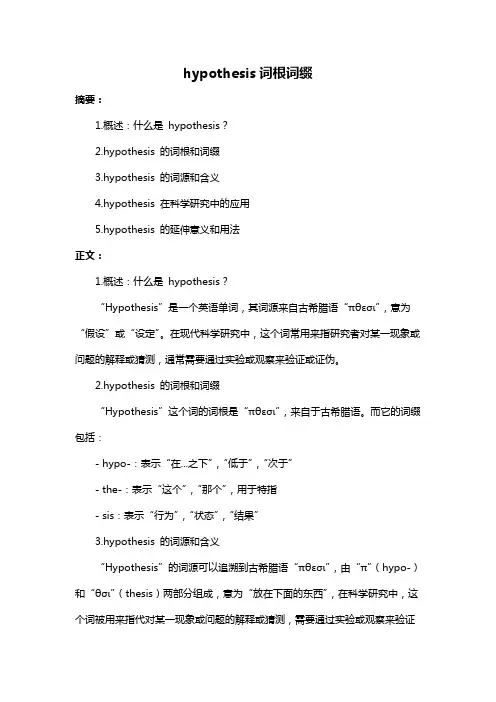
hypothesis词根词缀摘要:1.概述:什么是hypothesis?2.hypothesis 的词根和词缀3.hypothesis 的词源和含义4.hypothesis 在科学研究中的应用5.hypothesis 的延伸意义和用法正文:1.概述:什么是hypothesis?“Hypothesis”是一个英语单词,其词源来自古希腊语“πθεσι”,意为“假设”或“设定”。
在现代科学研究中,这个词常用来指研究者对某一现象或问题的解释或猜测,通常需要通过实验或观察来验证或证伪。
2.hypothesis 的词根和词缀“Hypothesis”这个词的词根是“πθεσι”,来自于古希腊语。
而它的词缀包括:- hypo-:表示“在...之下”,“低于”,“次于”- the-:表示“这个”,“那个”,用于特指- sis:表示“行为”,“状态”,“结果”3.hypothesis 的词源和含义“Hypothesis”的词源可以追溯到古希腊语“πθεσι”,由“π”(hypo-)和“θσι”(thesis)两部分组成,意为“放在下面的东西”,在科学研究中,这个词被用来指代对某一现象或问题的解释或猜测,需要通过实验或观察来验证或证伪。
4.hypothesis 在科学研究中的应用在科学研究中,研究者通常会根据自己对现象或问题的理解,提出一个或多个hypothesis,然后通过实验或观察来验证或证伪这些假设。
如果实验或观察的结果支持研究者的假设,那么这个假设就可能被接受为科学事实;如果实验或观察的结果与假设不符,那么研究者可能需要修改或放弃这个假设,重新提出新的假设。
5.hypothesis 的延伸意义和用法除了在科学研究中的应用外,hypothesis 也可以用来指代对未知事物的猜测或假设,比如在历史研究中,研究者可能会根据现有的证据,提出关于历史事件的hypothesis,然后通过进一步的研究和发掘来验证或证伪这些假设。
Features of the Hymmnos grammarHymmnos, described as the "language of emotions", has, as its most prominent feature, a sentence structure that focuses on expressing the speaker's feelings. Because it is focused on the speaker's feelings, statements nominally flow from a first-person perspective. As with so many other things, perhaps it will be easiest to understand how Hymmnos differs from other languages by looking at an example:Was yea ra chs hymmnos meaEmotion Sound verb object objectgreat, enjoyable happinessbecome song me(I am delighted)This sample sentence means "I am delighted to express myself through song," conveyed with an expression of genuine joy by the speaker.⠕ Emotion Sounds(想音)The first three words in a phrase comprise an Emotion Sound; the meaning of these three words are described in this section.[first : degree]-[second : nature]-[third : desirability]▼ First wordThe first word in an Emotion Sound describes the degree of the speaker's emotion.Rrha trance-likeWas very muchWee reasonableFou a littleMa discretionaryNn reluctant▼ Second wordThe second word describes the emotion being conveyed.i impatientyea happywaa happypaks excited, nervousnum nilki focused, concentratingwol fervourousapea blessed, bathed in happinessau sadgranme wanting to protect, bravetouwaka hopefulquel eager, desperateyant fearfulguwo angry, resentfuljyel lonelyzweie determined, sincere▼ Third wordThe third word describes how desirable the speaker finds the context of the emotion.ga I want this to stopra I want this to continueerra I want this to continue foreverwa I can tolerate thisgaya I never want this to happen againgagis I am indifferent<Effects of Emotion Sounds>Even when speaking the same core sentence, the meaning conveyed by a speaker whose emotional state is cool and collected may be wildly different from the meaning conveyed by a speaker who indicates seething anger. Some Hymmnos used to control Towers have different effects depending on the Emotion Words with which they are spoken. For example, a command used to open a door may receive a faster response if the emotional context with which it is delivered indicates desperation rather than calmness.⠕ Prescriptive syntaxIn the example above, although the word for "me" was used as a noun, it was not an indicator of narrative perspective. The nominal form of Hymmnos is first-person, which is logical because it is a language primarily centred around conveying the emotions of its speaker. However, structures do exist that allow statements to be expressed in terms of second- and third-person narrative perspectives, and these will be discussed shortly.General sentence structure[Emotion Sound]-[verb]-[compound] [VC][Emotion Sound]-[verb]-[object]-[compound] [VOC]In our example sentence, "Was yea ra chs hymmnos mea," the Emotion Sound is "Was yea ra," the verb is "chs," the first object is "hymmnos," and the variable component is another object, "mea".Compounds may be any structure satisfying [nil/O/VC/VOC], which means that sentences may be infinitely long, provided they continue to make use of nested compounds.External-perspective sentence structure[Emotion Sound]-[verb]-rre-[subject]-[verb]-[compound][Emotion Sound]-[verb]-rre-[subject]-[verb]-[object]-[compound]In this case, the sentence structure is [VSV'C/VSV'OC].The first verb, [V], indicates the speaker's action, and the second verb, [V'], indicates the subject's action."rre", the subject identifierBecause Hymmnos does not nominally have an explicit subject, it has need of a special subject-identifier; this identifier is "rre".When "rre" appears before an object, that object becomes the subject of the sentence. However, regardless of any shifts in subject, the sentence's Emotion Sound is relative only to the speaker.Pronoun alternatives to "rre"Subject-form pronouns may be used in place of a "rre-[subject]" component. Hymmnos's pronouns extend those found in English by accounting for gender and quantity.Pronoun Object form Subject formyou yor yorryou (plural) yora yorrahe hes herrthey (masculine) hers herrashe has harrthey (feminine) hars harraThis may be obvious, but no sentence may contain more than one subject, so "rre" or its equivalents may appear only once, precluding changes of focus in compounds.Historically, non-first-person sentences were not part of standard Hymmnos; it was not until the formation of Central Standard Note that "rre" formally became part of the language to further its communicability.⠕ Persistent Emotion Sounds definition syntaxThis section describes a structure that allows an Emotion Sound to be applied to an arbitrarily large collection of sentences. This is important because it prevents a speaker from having to continually express their emotions before every sentence in a series of related statements, such as a stanza in a hymn.Ma num ra 0x vvi. [Emotion sound ("Ma num ra") BEGIN]・ [any number of sentences in Hymmnos](Hymmnos sentence)・ [any number of sentences in Hymmnos]1x AAs ixi. [END]This means that, between the statements "0x vvi." and "1x AAs ixi.", every sentence will bear the Emotion Sound "Ma num ra". 0 and 1 are, of course, binary flags; as qualified numbers, "0x" is pronounced as "o ku", and, likewise, "1x" as "i ku".⠕ Variations on Emotion SoundsEmotionless sentencesEmotion Sounds, and, optionally, the initial verb, may be omitted from sentences, even when they are not part of a persistent Emotion Sound sequence, leading to [VC/VOC].When Hymmnos is spoken in this manner, it will not be processed by Towers, making it little more than a spoken, though highly melodious, language.Emotionless sentences may adopt a subject other than the speaker if they are presented in [SVC/SVOC] format. (In this case, the "rre" is optional)Overriding Emotion SoundsAlthough sentences expressed within the context of a persistent Emotion Sound sequence already bear Emotion Sounds by definition, it is possibleto explicitly change the Emotion Sound associated with a specific sentence by prefixing it with another; explicitly specified Emotion Sounds always take priority. Doing this saves the speaker the trouble of ending one persistent sequence for a single sentence, only to have to begin another sequence immediately afterwards.2.Before learning the grammar of the New Testament of Pastalie(感音句)...The grammar of Pastalie is based on the standard grammar of the First Era. Because of this, knowledge of that grammar is a prerequisite for understanding what will be discussed here.⠕ Grammar principlesPastalie(感音句) is based on the idea of expressing as much meaning and emotion as possible with as few words as possible. This variant of Hymmnos is so streamlined that, in some cases, a single word, known as an "Emotion Verb(感音)" is enough to form an entire sentence.1. Usage with implicit objectsWhen the subject of a sentence is implied by context, it is possible to form useful Hymmnos using only one word. Like usual, we will explore this concept with an example.hEmmErYE /.Emotion Verb invokeThis complete sentence, "hEmmErYE/.", means "I would be delighted to sing for your happiness".As a tease of what is to come, "Was yea ra chs hymmnos mea," the example from the standard grammar section, can be written in Pastalie as "cEzE hymmnos/."; both forms carry the same meaning: "I am delighted to express myself through song".Emotion Verbs are written as a series of alternating lower-case(小写)and upper-case(大写) letters; the exact details of this system will be described later. For now, the most important detail is how they identifytheir objects, given the implicit referencing nature of this sentence structure. The upper-case components indicate one of three possible scopes:•The speaker herself•An individual, singled out by context•All of the speaker's surroundingsIntuitively, if the objects relevant to the Hymmnos can be identified by one of these three scope limiters, then there is no need to explicitly identify them(就是说,如果满足上面三种情况,其宾语可省略); the qualifiers (upper-case components) packed into the Emotion Verb will convey all needed information.Sentences in Pastalie are terminated with "/."; fundamentally, this is the same as how sentences are normally terminated with a period in English, but this also has the effect of executing the spoken statement. As an alternative, "!" or "?" may be used to indicate the end of a statement without invoking anything.2. Usage with explicit objectsIf it is not clear what the objects are from context, they need to be qualified explicitly.hEmmErYE hymmnos /.Emotion Verb object invokeThis sentence is an extension of the one found in the previous example; it means "I would be delighted to sing a song for your happiness". Notice how the intent has not changed (the speaker still expresses eagerness over doing something to make a second party happy); the only difference is that it is now clear exactly what the speaker intends to do.The same structure may be used when identifying proper nouns; the syntax in that case is like [VO] in English.⠕ Emotion VerbsThe meaning of Emotion Verbs is not fixed. Depending on how they are constructed, they can convey very different things from sentence to sentence. This flexibility is the key to the expressive power of Pastalie.Emotion Verbs are formed of two types of elements: a template(感音成语) and Emotion Vowels.(想音词)Let's revisit our example word, "hEmmErYE". Its template is "h.m.m.r."and it has three emotion vowels: "E", another "E", and "YE". Notice that the template is written in lower-case letters, while the Emotion Vowels are written in upper-case.h E mm E r YE"I would be delighted to sing for your happiness"↓disassembly↓[template] h.m.m.r.[Emotion Vowels]1: E | 2: none | 3: E | 4: YEIn the following sections, the exact meaning of these components will be described.Template words[h.m.m.r.] (sing, express through song)The keys to template words are the dots (periods) that separate their component letters. These dots, called "Bank Slots"(字域), may hold Emotion Vowels, and it is the combination of these two elements that give them their meaning."h.m.m.r." has four Bank Slots, one after each letter. The significance of Emotion Vowels is reduced as they appear closer to the end of an Emotion Verb. In other words, the first Emotion Vowel in an Emotion Verb has the most influence over the meaning of the speaker's statement. To provide more flexibility in expressing emotional significance, Bank Slots may be left empty; Emotion Vowels appearing after an empty Bank Slot hold the same significance that they would were that space filled.If this confuses you, don't worry. An analysis of the example sentence's emotional meaning is provided at the end of this section.Emotion VowelsAs mentioned previously, Emotion Vowels are the upper-case letters found in Emotion Verbs. They may be placed into any of a template word's Bank Slots, or these Bank Slots may be left empty.There are three categories of Emotion Vowels; they may be used interchangeably to better reflect the emotions of the speaker, and membersof one group may be used together or reused to strengthen or elaborate the emotions behind a statement.Category 1: Emotions directed towards the speaker herselfCategory 2: Emotions directed towards another individualCategory 3: Emotions directed towards the speaker's surroundings (or the world)No one category is any less significant than the others; significance is determined based on how Emotion Vowels are ordered within an Emotion Verb.▼ Emotions directed towards the speaker herselfA あstrength, determinationI いpain, fear, desire to escapeU うsadness, concern (sometimes positive)E えhappiness, pleasureO おanger, maliceN んaloofness, relaxation, neutrality▼ Emotions directed towards another in dividualYA や(emotional sympathy)YI いぇいsuffering, pain, deathYU ゆsadness, anxietyYE いぇhappiness, fortuneYO よanger, rageYN ぅんcalmness, comfort▼ Emotions directed towards the speaker's surroundings LYA りゃ(emotional sympathy)LYI りぇいpain, destruction, ruinLYU りゅsadness, instabilityLYE りぇhappiness, satisfactionLYO りょstrife, chaos, warLYN りんcalmness, quietnessIn our example, "hEmmErYE", the Bank Slot allocation "1: E | 2: none | 3: E| 4: YE" indicates that the speaker's happiness is by far the dominant sentiment, although she could be happier, because the second slot isunused. The second party's happiness is significant, but not as significant as the happiness the action will provide the speaker.⠕ Nouns(感音指示宾语)Infel Phira(异感音), for which the New Testament of Pastalie was created, supports the standard noun forms found in other dialects of Hymmnos. However, with Pastalie's emphasis on succinct sentences, a noun syntax that couples ownership with emotional attachment has been developed. Once again, this language feature will be demonstrated with examples.Form 1 Egasar The speaker's stuffed animal; it makes her happy Form 2 YUgasar Someone else's stuffed animal; it worries them Form 3 LYNgasar Everyone's stuffed animal; it soothes themForm 4 Agasar_cloche Cloche's stuffed animal; it gives her strengthAs seen above, an Emotion Vowel that prefixes a noun indicates to whom it belongs, as well as the nature of their emotional connection to the entity being described. This table formalizes the pattern, using the Emotion Vowel family "A" as an example.Owner Expression formme A[object]you YA[object]everyone,LYA[object]the land,the worlda specificA[object]_[person's name]personwYEsA Agasar_luca/."I will give you Luca's precious stuffed animal to make you happy." (This simple sentence offers an idea of how expressive Pastalie forms can be)⠕ The structure of long sentencesAs sentences become longer, the differences between the New Testament of Pastalie and standard Hymmnos become less pronounced. Indeed, the sentence structures start to appear very much the same:[Emotion Verb]-[compound] [VC][Emotion Verb]-[object]-[compound] [VOC]As you can see, when long sentences are required, the advantages of Pastalie are dramatically lessened. (Compounds, of course, may be built in the same manner as in other Hymmnos dialects)⠕ "x.", the subject identifier(感情提示作用)Just as in standard variants of Hymmnos, the New Testament of Pastalie features a means of explicitly specifying the subject of a sentence. However, the emotional expressiveness permitted by this structure has been expanded.[x.]-[rre]-[subject]-[Emotion Verb]-[compound][x.]-[rre]-[subject]-[Emotion Verb]-[object]-[compound]"x.", as you may have noticed, bears a Bank Slot. It accepts an Emotion Vowel that may be used to describe the speaker's emotions regarding the subject of the sentence.xE rre cloche cEzE hymmnos/."Cloche is delighted to express herself through song and this makes me happy."Just as with standard Hymmnos, the subject identifier "rre" and the subject it identifies may be omitted in favour of a pronoun; there are no differences in how pronouns are defined in the New Testament of Pastaile. An example follows:xI harr cEzE hymmnos/."She is delighted to express herself through song and this makes me jealous."Lazy, a contributor to the wiki on Conlang, made note of the following information. It is unconfirmed, but because it seems reasonable and significant, it has been included here."x." is used primarily with Category 1 Emotion Vowels and they carry slightly different meanings in this context:A あindifferentI いjealousU うconcernedE えhappyO おangryN んopposed"x." has been used with Emotion Vowels from other categories, but their implications are still unknown at this time.⠕ Grammatical flexibilityThe New Testament of Pastalie introduces additional rules that broaden the range of feelings that may be communicated. This section provides a brief overview of how they work.Passive voice(被动音调)Appending a "-eh" suffix to an Emotion Verb will cause the sentence to be interpreted in the passive voice.hEmmErYE"I would be delighted to sing for your happiness" (active voice)hEmmErYEeh"Singing for your happiness would delight me" (passive voice) EmphasisBy placing "rre" before a pronoun that does not normally require a subject identifier, its significance will be emphasized, which narrows the scope of the statement.xE rre yorra cEzE hymmnos/."Cloche and company are delighted to express themselves through song and this makes me happy."Negation(否定音调)Placing "zz" before an Emotion Verb or noun (Emotion Sound optional) will cause it to carry meaning opposite its normal interpretation.zz hEmmErYE/."I would not be delighted to sing for your happiness"zz arhou"despair" (normally "hope")Using Emotion Verbs as objectsIf all Bank Slots in an Emotion Verb are left unused, then the template word may be interpreted as an action, like a gerund in English.fEwrEn h.m.m.r. eje/."I am very happy to embrace the singing of my heart"QuotationIn the New Testament of Pastalie, Hymmnos between :/ and /: is considered quoted, just like encapsulating text between "" in English.⠕ FunctionsUnder the New Testament of Pastalie, it is possible to define a complete Hymmnos passage and enumerate a name by which it may be invoked in the future. The syntax for invoking this mechanism follows:[function name]->[Hymmnos passage]("->" is pronounced as "pass")Upon completion, it is possible to invoke the complete, stored passage with the single word provided as the name of the function. As always, an example follows.ishikawa -> jYOzAt METHOD_HYMME_ISHIKAWA_JANNE/. !ishikawa! ishikawa! ishikawa! ishikawa!In this example, the Hymmnos "jYOzAt METHOD_HYMME_ISHIKAWA_JANNE/." was stored in a function named "ishikawa". It was then invoked four times. (Of course, because "!" was present at the end of every statement, nothing would actually happened)⠕ Putting it all togetherNote that all of these statements are actually in the infinitive tense. However, conveying that while making the translation flow is difficult, so some of them have been written in incorrect quasi-future-tense.Example wordsh YA mmr A"I will sing my best for you"h YI m O m O r O"I will sing of how I want you to suffer"h YE m YE m A r A"I will sing as best I can for your elation"h E m E m A r A"I will sing as best I can to express my elation"h LYI m LYU m O r O"I will sing angrily of bringing ruin and chaos upon the world"Example statementsComplete sentences including nouns are presented below. Any noun present in standard Hymmnos may be used with Emotion Verbs within the context of the New Testament of Pastalie.hYAmmrA chroche/."I will sing my best for Cloche"hYImOmOrO!"I will sing of how I want you to suffer" (not invoked)cEzE hymmnos/."I am delighted to express myself through song"cYEzYE hymmnos/."You are delighted I am expressing you through song"xN rre harr hLYImLYUmOrO a.u.k. zess quesa/."Her singing is like a sharp lightning strike upon the land"。
hymenium 词根词缀
摘要:
1.概述hymenium 的含义和词源
2.介绍hymenium 的词根和词缀
3.举例说明hymenium 在实际应用中的例子
正文:
hymenium 是一个来自拉丁语的词汇,意为“婚礼”,在现代英语中,它通常用于描述与婚礼或者婚姻相关的事物。
在语言学中,hymenium 的词根和词缀经常被用来构建新的词汇。
hymenium 的词根是“hymen”,它源于古希腊语的“hymenaios”,意为“婚礼之歌”。
在英语中,这个词根通常用于描述与婚礼或者婚姻相关的事物,如“hymen”(处女膜)和“hymeneal”(婚礼的)。
hymenium 的词缀包括前缀“hymen-”和后缀“-al”。
前缀“hymen-”表示“与婚礼或婚姻相关”,后缀“-al”表示“与……有关”。
这些词缀常常被用来构建新的词汇,如“hymenopteran”(昆虫纲中的一个目,包括蜜蜂、黄蜂等),“hymenology”(研究婚礼和婚姻的学科)。
在实际应用中,hymenium 的词根和词缀被广泛使用。
例如,在生物学中,hymenoptera 是昆虫纲中的一个目,包括蜜蜂、黄蜂等,它们的名字就来源于hymenium 的词根“hymen”。
在社会学中,hymenology 是研究婚礼和婚姻的学科,它的名字就来源于hymenium 的词根“hymen”。
EuphemismPrepared by 宋秋静荣姿费敏张琦Euphemism(委婉语) 为希腊语,意为悦耳的话。
使用委婉语是用更礼貌、更文雅或更有分寸的词语来替代刺耳或不得体的表达方式。
请比较:1.When I heard that her father had kicked the bucket, I hurried to offer mysympathy.2.On hearing that she lost her father, I hastened to offer my deepest condolences.亲朋过世令人悲痛,谈到吊唁语气要庄严肃穆。
第一句中的“死”用kick the bucket 俚语表达,如同无理取闹,没有丝毫吊唁的味道。
第二句中的“死”用lost,委婉庄重,且有惋惜之意,加上主句用书面语,整句的语气显得严肃认真,词语间透出对死者的尊重、对亲友的同情。
委婉语的作用由此可见一斑。
一、定义Euphemism derived from the Latin word"Euphemisms"."eu"refers to"good","phe mism"refers to"speech",its literal meaning is"word of good omen".英语中委婉语(euphemism)一词源于古希腊语。
在古希腊语中,“eu-”的意思是“well(好)”,而词干“-pheme”的意思是“speech,saying(言语)”,“-ism”是一个词后缀,简单地说,euphemism的意思是“fair speech(说好话)”。
委婉语是一种修辞格,更是一种文化现象,是人们在社交中为了谋求一种理想效果所创造出来的一种适当的语言形式。
二、委婉语的交际功能1.避讳功能由于人们对某些事物或现象的恐惧或是羞于提及,在语言表达时不愿言或是不敢言,由于现实需要,不得不表达此种意思时,便使用委婉语来代替。
英语中的委婉语英语委婉语的概念英文euphemism(委婉语)一词系源自希腊语。
词头"eu-"的意思是"good"(好),词干"phemism"的意思是"speech"(言语),整个字面意义是"word of good omen"(吉言)或(好的说法)。
一般认为,凡是表示禁忌或敏感事物的含蓄、迂回或动听的言词,均在委婉语之列。
英语委婉语的分类英语委婉语一般可分成两大类:传统委婉语(traditional euphemisms)和文体委婉语stylistic euphemisms。
所谓传统委婉语亦称是与禁忌语密切相关的。
象生、病、死、葬、性、裸、拉、撒等禁忌事物,如果直接表达,那就是禁忌语,给人的感觉是粗鄙,生硬,刺耳,无礼。
反之,如果间接表达,这就是委婉语,给人的印象是典雅,含蓄,中听,有礼。
所谓文体委婉语,亦称实际上是恭维话、溢美之词,与禁忌语并无关系。
英、美人(尤其是当代美国人)在交际过程中,为了表示礼貌,为了避免刺激,或是为了争取合作,有时会采用夸饰的手法,对一些令人不快的事物以美言相称。
英语委婉语的构成方法英语委婉语的构成方法各种各样,丰富多彩。
一般可分为下面几种类型:构词手段,拼写手段,词汇手段,语法手段和修辞手段等。
(1)合词法(compounding):如:gezudna(goes+under+“床下放”,即夜壶)。
(2)反成法(backformation):反成法是通过删除假想中的词缀来构成委婉词。
由于这种构词法产词是不大,所以造出的词大多新颖别致,用来代替常见的敏感词,也能收到委婉的效果。
如:bugle(盗窃,由burglar[夜盗]盗删去“词尾”而成,用以替代。
(3)首字母组合法(acronym):首字母组合法是将禁忌词语或敏感词语的第一个字母抽出来拼合在一起借以掩饰。
如:BM(bowel movement,大便)the Big C(癌症)。
hydrargyrum的词根"Hydrargyrum"是拉丁语中的一个词,意为"水银"。
它的词根可以追溯到希腊语中的两个部分,"hydor"和"argyros"。
下面我将从词根的起源、含义和相关词汇等多个角度来回答你的问题。
首先,词根"hydor"来自希腊语,意为"水"。
这个词根常用于描述与水相关的事物,例如"hydro"(水的)和"hydrology"(水文学)等。
在"hydrargyrum"中,"hydor"表示水银的液态特性。
其次,词根"argyros"也来自希腊语,意为"银"。
这个词根通常用于描述与银相关的事物,例如"argent"(银的)和"argyria"(银染病)等。
在"hydrargyrum"中,"argyros"表示水银的银白色外观,因为水银的外观与银相似。
综上所述,"hydrargyrum"的词根可以解释为"水"和"银"的组合。
这个词根强调了水银的液态特性和银白色的外观。
通过了解词根的含义,我们可以更好地理解与水银相关的词汇和概念。
衍生词汇中有一些与水银相关的术语,例如"mercury"(水银)和"mercurial"(善变的)。
此外,水银在化学和医学领域中有广泛的应用,如"mercury thermometer"(水银温度计)和"mercury poisoning"(水银中毒)。
这些词汇和概念都与水银的性质和特点密切相关。
hypothesis词根词缀
摘要:
1.概述:hypothesis 的词根和词缀
2.hypothesis 的词根:hypothesis, hypothesos
3.hypothesis 的词缀:-sis, -sis
正文:
hypothesis 是一个广泛使用的英文单词,它指的是对某个观点或假设的陈述。
了解这个词的词根和词缀有助于我们更好地理解其含义和用法。
首先,让我们看看hypothesis 的词根。
这个词源于古希腊语,有两个主要的词根:hypothesis 和hypothesos。
其中,hypothesis 在现代英语中通常被写作hypothesis,而hypothesos 则较少使用。
这两个词根都表示“假设”或“设想”,是hypothesis 的核心含义。
接下来,我们看看hypothesis 的词缀。
在英语中,词缀通常用来改变单词的含义或词性。
对于hypothesis,最常用的词缀是-sis 和-sis。
这两个词缀都可以使名词变为动词,表示“提出假设”或“建立假设”。
总的来说,hypothesis 这个词的词根和词缀都反映了其基本含义:假设或设想。
无论是在科学研究中,还是在日常生活中,我们都会用到这个词来表达我们的想法或观点。
ヒュムノス単語意味発音流派Tanta 舞蹈タンタ正纯(共)Yuez 相互ユェゼ正纯(共)Zauve 一个瑞利ザーベ古月咒(古代语)0 0 ネル/オ(二進法)正纯(共)1 1 ノイ/イ(二進法)正纯(共)10 10 デク/デ正纯(共)100 100 ヘク/ヘー正纯(共)1000 1000 キク/キィ正纯(共)10000 10000 ミク/ミィ正纯(共)2 2 ジ正纯(共)3 3 ドリ正纯(共)4 4 フェフ正纯(共)5 5 ヴィラ正纯(共)6 6 イクサ正纯(共)7 7 ヘプト正纯(共)8 8 オクタ正纯(共)9 9 ネイ正纯(共)<-x 这 (ス)パグ新约(Pasutaria律)ChronicleKey 编年史键 Hymmnos a律(EOLIA属)Dia 王、王座、玉座、支配者ディア正纯(共)Fou 稍微(第Ⅰ想音)フォウ正纯(共)Harmonius 进行合音ヒュムノス正纯(共)Linca 链接程序ヒュムノス正纯(共)Ma 平常心(第Ⅰ想音)マ正纯(共)Manac 真名、灵魂的名字、御魂名マナク古月咒(古代语)Metafalica メタファリカ metafalis律(神圣语)Nn 无気力状态(第Ⅰ想音)ン正纯(共通语)None None None 正纯(共通语)Paja 清洗剂パージャ正纯(共)Phantasmagoria 千变万化的风ファンタスマゴリアa律(EOLIA属)Re=Nation 国家リネイション正纯(共)Rig=Veda 吠陀リグヴェーダ metafalis律(神圣语)Rrha 恍惚状态(第Ⅰ想音) [ルル]ラ正纯(共)Suspend 暂停サスペンド正纯(共)Was 很、非常强烈的(第Ⅰ想音)ワス正纯(共)Wee 颇、相当的(第Ⅰ想音)ウィ正纯(共)a.u.k. 相当于动词アウク新约(Pasutaria律)accrroad 带来えるアクロード正纯(共)acra 当然、肯定アクラ正纯(共)adyya 今日アディーア正纯(共)afezeria 祝福するアフェゼリア正纯(共)ag 而且、和アグ新约(Pasutaria律)aiph 如果アィフ正纯(共)aje 新アジェ新约(Pasutaria律)akata 故事アカタ正纯(共)ale 声音アーレ新约(Pasutaria律)alroetsue 赎回、赎罪アゥロエットューエ metafalis律(神圣语)ammue 声波(声)波動アミュ古月咒(古代语)an ~再加上アン正纯(共)anw ~をアンワ、アンゥ metafalis律(神圣语)apea 沉浸于幸福中(第Ⅱ想音)アペア古月咒(古代语)ar 只有一个アル正纯(共)arhou 希望アーフー新约(Pasutaria律)arrya 箭头アリャ正纯(共)arsye 共享アーシェ正纯(共)art 通过アルト正纯(共)au伤心 a律(EOLIA属)aulla 开放、公开、泄露アウラ正纯(共)ayulsa 永远アユルサ新约(Pasutaria律)balduo 黑暗的、看不见的バルドゥー新约(Pasutaria律)bale 球バレ正纯(共)bansh (粗暴的)打开(门)バンシュ正纯(共)basilic 大砲バジリク正纯(共)bautifal 美丽的バティファル正纯(共)beja 脏ベジャ古月咒(古代语)beng 以前(時間的)前ベング正纯(共)bengnuih黄昏ベヌイ正纯(共)bexm (時間)来访问ベズム正纯(共)biron 遵循ビロン正纯(共)bister 野兽ビステル正纯(共)boches 口ボチェス正纯(共)boh 爆炸、超自然ボッフ metafalis律(神圣语)brinch 枝ブリンク正纯(共)briyante 欢乐之声ブリイャンテ metafalis律(神圣语)burle 蓝色ブゥレ正纯(共)c.z. 改变スズ新约(Pasutaria律)cause 诅咒、折磨カウゼ metafalis律(神圣语)cecet 屏蔽ケケト正纯(共)ceku 朋友、同胞セク新约(Pasutaria律)celetille 明亮、清新、美丽的セレティル正纯(共)celle 高天セルレ正纯(共)cenjue 改变チェンジュエ metafalis律(神圣语)cerchio 潜力チェルキオ正纯(共)cest 真实的、真正的、真理セスト正纯(共)cexm (人或物体)前来参观セズム正纯(共)chanti 赞誉、好评シャンティ正纯(共)chiess 吻チェス正纯(共)chs 来~ チス正纯(共)chsee 变化~るチーセ正纯(共)chyet特别,我被选中シェッ古月咒(古代语)cia 天空シア新约(Pasutaria律)ciel 天空(意译)世界シェール正纯(共)ciellenne 天空シエルレーニェ正纯(共)clalliss 给颜色、颜色クラリス正纯(共)clamour 膝盖クラマー正纯(共)clare 透明清楚クラレ正纯(共)clemezen 发疯、发狂的クレムゼン正纯(共)clyncye 纯粹、无色クリンシェ古月咒(古代语)colga 冰クオルガ正纯(共)crannidale 共享クラニダーレ metafalis律(神圣语)crudea 痛苦、苦恼クルーデア metafalis律(神圣语)crushue 纺クルシューエ metafalis律(神圣语)cupla 罪キュプル正纯(共)cyuie 痛苦、可悲的キュイ正纯(共)cyurio 管理、秩序キュリオ正纯(共)d.n. 舞蹈ドゥン新约(Pasutaria律)d.z. 死亡ズ新约(Pasutaria律)daedu 丑陋的ダェドゥス新约(Pasutaria律)dand 门ダンド正纯(共)dauan 黎明ダウアン正纯(共)dauane 曙光ダウアネ正纯(共)deata 判决、裁决、断罪ダーテ古月咒(古代语)deggeez 背叛、不服从ディジーズ正纯(共)degle 歼灭デグル古月咒(古代语)dejuy 赎罪デジュィ新约(Pasutaria律)deleir 灾祸デレイア a律(EOLIA属)delij 不愿意的、恨 a律(EOLIA属)den し但是デン正纯(共)denera 坏事デネラ正纯(共)der通过在~ デァ metafalis律(神圣语)desfel 恨、不愿意ィスフェル metafalis律(神圣语)dhezeall 俘虏、被囚禁的人ディージアル metafalis律(神圣diasee 神的儿子ディアズィエー metafalis律(神圣语)didalia 咒语ダイダリア古月咒(古代语)dilete 神的加持ディレーテ正纯(共)discest 伪装ディセスト正纯(共)dius 宝贵的、虔诚的ディウス古月咒(古代语)diviega 圣灵的宝剑、大智慧ディヴィエーガ古月咒(古代语)dn 在~ ドゥン新约(Pasutaria律)doodu 大地ドードゥ新约(Pasutaria律)dople 消除ドプレ正纯(共)dor 大地、大陸ドール正纯(共)dorn 树ドルン正纯(共)dornpica 坚果ドゥルンピカ古月咒(古代语)drone下载、捕获ドゥローネ正纯(共)dsier 欲望ヂェア正纯(共)du 一~ ドゥ新约(Pasutaria律)dyya 日(英語のDay)ディーア正纯(共)dyyal 日~ ディーアル正纯(共)eazas 彼此イーザス正纯(共)echrra 共鸣エクラ正纯(共)ee 伟大的、荣誉的ィエエ metafalis律(神圣语)eetor彼岸エトゥー正纯(共)eje 心灵、情感エジェ新约(Pasutaria律)elle 从~ エル正纯(共)elye 尽管如此、仍然エリェ新约(Pasutaria律)en 而且、因为~ エン正纯(共)enclone 结束语エンクロゥネ metafalis律(神圣语)endia 停止。
结束エンディア metafalis律(神圣语)ene 认为、情绪エヌ古月咒(古代语)enegd睡觉エネグドゥ正纯(共)enerel 多エネレル古月咒(古代语)enesse 思想エネッセ古月咒(古代语)engassya 给我!抢エンガーシャ正纯(共)enne 祈祷、希望(好的意味)エニェ正纯(共)enrer 总是エンリャ古月咒(古代语)enter 错误进入~ エンテル正纯(共)enw虽然到~ エンウ正纯(共)erra 想永远保持积极的(第Ⅲ想音)エーラ正纯(共)ess 在~ エース新约(Pasutaria律)et 大エ正纯(共)eta 吃エータ正纯(共)etealune 永遠エテルネェ metafalis律(神圣语)eterne 永遠エテールネ a律(EOLIA属)eux 眼ユクス正纯(共)exec 运行エグゼク正纯(共)f.r.l. 成了惊弓之鸟フルル新约(Pasutaria律)f.s. 耳语エフス新约(Pasutaria律)f.w.r 接受フウル新约(Pasutaria律)f.w.r.n 包裹フウルン新约(Pasutaria律)faf 可怕的ファフ古月咒(古代语)faja 推进ファージャ古月咒(古代语)famfa 扑ファンファ正纯(共)fandel 很多ファンデル metafalis律(神圣语)fane 慈愛ファーネ正纯(共)fatele 父亲ファテレー metafalis律(神圣语)fatere 否则、这将是~ ファーテレ正纯(共)fau 鳥ファウ metafalis律(神圣语)faura 小鳥ファウラ metafalis律(神圣语)fayra 火、炎ファイラ正纯(共)fedyya 明日フィディーア正纯(共)ferda 住フェルダ metafalis律(神圣语)fernia 微笑フェーニャ古月咒(古代语)fhyu 風ヒュフ正纯(共)firle 感觉フィルレ metafalis律(神圣语)flare 浮子フラレ正纯(共)flip 工作人员交流フリプ古月咒(古代语)fluy 泉フリュイ正纯(共)fogabe 饶恕フォーゲイブ正纯(共)folten 前(位置、方向)フォルテン正纯(共)forgandal 因为!フォーガンダル古月咒(古代语)forlindel宗族首长フォーリンデル古月咒(古代语)forlinden 村フォーリンデン古月咒(古代语)foul 不思議、神秘フォウル古月咒(古代语)fountaina 满意、将它填补ファウンティナ正纯(共)fowrlle 安慰フォワール正纯(共)frawr 花ラーワ正纯(共)frawrle 春ラワール古月咒(古代语)frissoner 颤抖るフリッソネア正纯(共)fs 威风フス新约(Pasutaria律)ftt 消失フッ正纯(共)fulual 叶子フルアル正纯(共)fusya 包裹フーシャ正纯(共)futare 未来フターレ正纯(共)fwal 翅膀フワル古月咒(古代语)fwillra 羽、羽毛、ひとひらフィラ古月咒(古代语)g.k.n 城ガッン新约(Pasutaria律)g.w.f.r. 法官グウフル新约(Pasutaria律)ga 我希望尽快结束的(第Ⅲ想音)ガ正纯(共)gagis 自己怎么样也无所谓(第Ⅲ想音)ギャギス metafalis 律(神圣语)ganna 坚固的、顽强的、稳健、石头、岩石ガナ正纯(共)garlden 街ガルデン正纯(共)gasar 填充玩具ガサル新约(Pasutaria律)gat 诅咒ガット正纯(共)gatyunla 被诅咒的土地、地狱ガチュンラ古月咒(古代语)gatyuny 诅咒ガチュニ古月咒(古代语)gauzewiga 绝望的ガゥンゼーヴィーガ metafalis律(神圣语)gaya 不再回到之前的状态了(第Ⅲ想音)ガヤ正纯(共)geeow 发誓、决意ギオ正纯(共)getrra 脏ゲットラ正纯(共)gigeadeth 钢铁的、铁ギガディス正纯(共)gkgul 如雨后春笋般涌现グックル新约(Pasutaria律)glansee 伟大的、神一样的グランズィ新约(Pasutaria律)glasden 最高グラスデン metafalis律(神圣语)goa 只有~ ゴア新约(Pasutaria律)gool 饿グール正纯(共)got 得到ゴット古月咒(古代语)gott 离开!退散!(觉得脏)ゴット正纯(共)govaz 未婚妻ゴーヴァズ古月咒(古代语)gral 所有グラル新约(Pasutaria律)gran 打开帷幕グラン古月咒(古代语)grandee 守護者グランディエー metafalis律(神圣语)grandus 保护グランドゥス metafalis律(神圣语)granme 有勇气、希望保护某人(第Ⅱ想音)グランメ正纯(共)grave 山寨グレィヴ古月咒(古代语)grlanza 舞蹈グランツァ正纯(共)grrena 緑緑色的碧グレナ正纯(共)grruw 成长グルゥ正纯(共)guard防御グアルド正纯(共)guatrz 生气、憎悪ゴーッ正纯(共)guaysu 展望未来グァイス正纯(共)guol 关门グォル正纯(共)guwo 发怒的、愤怒的(第Ⅱ想音)グウォ正纯(共)gyaje 過ちギャジェ正纯(共)gyajlee 罪人ギャジェレ古月咒(古代语)gyas 悪霊、恶的成分ギャス正纯(共)gyen 旋转、产生(魔术)ジェン古月咒(古代语)gyenel 魔導士ジェネル古月咒(古代语)gyengyat 喝酒、吞吃ジェンジャット古月咒(古代语)gyuss 抱擁ギュス正纯(共)gyusya 主宰、支配るギュシャ正纯(共)h.k.t.t 抱擁する、抱きしめるハクト新约(Pasutaria律)h.l.s.s. 叹息フルス新约(Pasutaria律)h.m.m.r. 讴歌、唱フムル新约(Pasutaria律)h.p.p 认为フプ新约(Pasutaria律)h.p.ps. 突出的想法フップス新约(Pasutaria律)h.r.n.t. 进行一个旅程ハント新约(Pasutaria律)h.w.s.s. 增长フウス新约(Pasutaria律)haf 持有的、拥有的、所有的ハフ正纯(共)handeres 敗北、失败ヘンデレス正纯(共)hao 上、上位、高位、上級ハオ正纯(共)harmon (多数)按照ハーモン正纯(共)harphe 早上ハルフェ新约(Pasutaria律)harr 她(主語定義)ハ[ルル] 正纯(共)harra 她们的(主語定義)ハ[ルル]ラ正纯(共)hars 她们的ハルス正纯(共)hartes 愛ハーテス古月咒(古代语)harton 爱ハートン正纯(共通语)has 她ハス正纯(共通语)hasyu 魚ハシュ正纯(共)heath 灼熱的高温的ヒース正纯(共)heetha 健康ヒィーサ正纯(共)heighte 伤害ヘイテ metafalis律(神圣语)her 这イァ正纯(共)here 这里イア正纯(共)herr 他(主語定義)へ[ルル] 正纯(共)herra 他们(主語定義)へ[ルル]ラ正纯(共)hers 他们へルス正纯(共)hes 他ヘス正纯(共)hieg 哀其不幸、悲伤ヒーグ正纯(共)hierle 悲伤ヘィアルレー metafalis律(神圣语)hiew悲哀ヒーウ新约(Pasutaria律)hiewi 痛苦的、可悲的ヒーウィ新约(Pasutaria律)hopb 心脏(作为一个事件来表示)ホップ古月咒(古代语)houd 抱ホウド正纯(共)hueaf 无用的、愚蠢的、徒劳的ヒャフ正纯(共)hyear 嘛、嘿嘿(呼叫)嘿イェア、ヤ正纯(共)hyma 听(说话)ヒュマ正纯(共)hymma 小鳥ヒュンマ正纯(共)hymme 歌唱、演奏、共鸣ヒュム正纯(共)hymmne 曲调、旋律、声波ヒュムネ正纯(共)hymmnos 詩ヒュムノス正纯(共)hynne 声ヒュン正纯(共)hyzik 肉体、体フィジク a律(EOLIA属)i 焦虑(第Ⅱ想音)イ正纯(共)iasien 朝露イアシェン古月咒(古代语)ides 過去イデス正纯(共)idesy 过去的イデシー正纯(共)ieeya 希望イーヤ正纯(共)iem 现在イェム metafalis律(神圣语)infel 愛インフェル metafalis律(神圣语)inferiare 親愛的先生インフェリアーレ metafalis律(神圣ini 初期的、无辜的イニ古月咒(古代语)innna (精神世界的)中、头脑中インナ古月咒(古代语)irs 存在イルス正纯(共)j.l.j. 圈养、坚持、适合ジェルジェ新约(Pasutaria律)j.l.r. 回到现实中来、回到理智るジュール新约(Pasutaria j.w. 托付ジェウ新约(Pasutaria律)j.z.t. 发动、实行ジェズト新约(Pasutaria律)jam 在一起(副詞)ジャム正纯(共)jambea 足ジャンベァ正纯(共)jass 寻求るジャス正纯(共)jenge 敵人ジェンジェ古月咒(古代语)jenhah 不幸、灾难ジェンハー古月咒(古代语)jouee 神的力量ジュエ正纯(共)jyel 孤独的(第Ⅱ想音)ジェール正纯(共)k.r. 嬉闹、混乱的场合クル新约(Pasutaria律)k.v.n.r. 挑挑战ケヴンル新约(Pasutaria律)kajya 必要カジャ新约(Pasutaria律)kapa 水カパ古月咒(古代语)keen 光芒ケーン正纯(共)keenis 闪耀ケニス正纯(共)keg 树枝ケグ新约(Pasutaria律)khal 保护クァル正纯(共)ki 认真的、集中的(第Ⅱ想音)キ正纯(共)kiafa 听キアファ metafalis律(神圣语)kierre 一刻、瞬間キェーッレ metafalis律(神圣语)kil 杀人キル正纯(共)knawa 知道ノーワ正纯(共)kneet 晚了、太晚ニート正纯(共)koora 小河コーラ正纯(共)kouf 叹息クーフ新约(Pasutaria律)ks 给予暗示ケス古月咒(古代语)kuhle 毒、毒薬キューレ正纯(共)l.l.n. 祝福リリン新约(Pasutaria律)l.n.c.a. 领导ルンカ新约(Pasutaria律)la 那正是(强调,为了冠词元音前)ラ正纯(共)lamenza 悲ラメンツァー metafalis律(神圣语)lapo 相遇ラポ古月咒(古代语)lasye 少年ラシェ正纯(共)leaff 本、書物、絵本リーフ metafalis律(神圣语)leat 弹奏リー正纯(共)lequera 这是一个很好的东西リクウィラ古月咒(古代语)li 那正是(強調する為の冠詞子音の前)リ正纯(共)linen 谈论リーネン古月咒(古代语)lir 光ライル a律(EOLIA属)lirle 夏リレール古月咒(古代语)llizz 说不定、也许、或许リズ正纯(共)lof 場所ロフ古月咒(古代语)lurrea 战栗ルーッレア metafalis律(神圣语)lusye 光ルーシェ metafalis律(神圣语)lyafre 蝶リャフレ古月咒(古代语)lyuma 星リュマ新约(Pasutaria律)m.a.m. 存在るマム新约(Pasutaria律)m.n.g. 咽下ング新约(Pasutaria律)m.t.y.y. 制造、生产マトウィ新约(Pasutaria律)maen 満月マエン新约(Pasutaria律)mahin 手マァイン正纯(共)manaf 命、生命マナフ metafalis律(神圣语)manafaln 转生マナファルン古月咒(古代语)manafeeze 生活マナフィーツェ metafalis律(神圣语)maoh 毛マオ metafalis律(神圣语)marta 母マルタ metafalis律(神圣语)maun 眼睑マウン古月咒(古代语)maxim 最マクシム正纯(共)maya 魔法、超自然マヤ古月咒(古代语)mea 我ミーァ正纯(共)mean 我们ミーン正纯(共)melenas 我爱你メレナス古月咒(古代语)melifan 歴史メリファン metafalis律(神圣语)melvaz 嫁メルヴァズ古月咒(古代语)memora 记忆メモーラ正纯(共通语)meo 理想メオ正纯(共通语)merra 我们(主語定義)ミーラ正纯(共)meryu 記憶メリュ新约(Pasutaria律)meso 抛洒メソ正纯(共)messe 传达メッセー正纯(共)morto 死モルト正纯(共)murfan 思念ムルファン metafalis律(神圣语)murfanare 思念ムルファナーレ metafalis律(神圣语)n.m.l. 染上ンム新约(Pasutaria律)na 否定ナ正纯(共)naave 所以~ ナァベ新约(Pasutaria律)nafa 有好ナファ新约(Pasutaria律)nafan 平缓ナファン新约(Pasutaria律)naflansee 幸福ナフランズィー新约(Pasutaria律)naja 缩回、降低。